
This eBook is for the use of anyone anywhere at no cost and with almost no restrictions whatsoever. You may copy it, give it away or re-use it under the terms of the Project Gutenberg License included with this eBook or online at www.gutenberg.org
Title: Advice to Singers
Author: Frederick James Crowest
Release Date: October 10, 2012 [eBook #41013]
Language: English
Character set encoding: UTF-8
***START OF THE PROJECT GUTENBERG EBOOK ADVICE TO SINGERS***
| Note: | Images of the original pages are available through Internet Archive. See http://archive.org/details/AdviceToSingers |
This e-text contains UTF-8 (unicode) characters that might not display properly in
your browser or font, such as the flat music symbol and words in Greek.
For additional Transcriber's Notes, click here.
ADVICE TO SINGERSBY "Since singing is so good a thing 
SEVENTEENTH THOUSAND LONDON |

SINGING cannot be learnt from a book, and so far from attempting any such impossible feat as writing a book which might be called "Singing without a Master," the author's object—frequently insisted upon herein—is to point out the impossibility of overcoming the difficulties of singing without a teacher. At the same time, there are points upon which a master would not feel called upon to speak; nor would he (except, perhaps, in the course of a very long period of training) be likely to touch on many matters which, though closely connected with the life or business of an accomplished singer, yet lie rather outside the province of the voice-trainer.
In a work consisting of detached paragraphs, and not being a continuous essay, it is not always possible to enter into full explanations of the reasons for certain statements; and (for the want of such explanation) one paragraph may appear to contradict another. However, I can assure the reader that such paragraphs are only apparent contradictions; and if he will take the trouble to think such points out for himself, he will find that they are easily reconcileable.
There is no subject, perhaps, on which opinions are so divided, and prejudices run so high, as the proper method of training and using the voice; nor is there perhaps one more wrapped in mystery than is the art of singing. This is probably the result of that readiness with which almost every music teacher has hitherto undertaken to teach Singing. This book will not, I am sure, add to the mystery. A careful perusal of its contents should clear away many misconceptions, and place the student on the right road to that end which he or she has in view.
That another large edition of this little Manual should be called for in so comparatively short a time is sufficiently encouraging testimony of the worth of the book and the favour it has found at the hands of students of singing and others—a result the more gratifying to the publishers since hitherto it has been issued with an anonymous title-page. Often has the authorship of the little volume been industriously defended and disputed—not by myself—both in this country and America; but, on the whole, the identity of its originator has been well maintained. For my part matters might have remained so, especially as I am not insensible to the fact that there is much "preaching" herein—as indeed there must be in such a work, and some of the advice is of such a nature that its giver runs the risk of being placed upon an exceeding high pinnacle of moral excellence, or of being accounted the personification of all the virtues—both of which distinctions might scarcely be merited. The appearance of my name upon the title-sheet is the result of no wish of mine, and I have consented to it only out of deference to the pressing request of the publishers.
A chapter on the Physiological Surroundings of the Voice has been added to this edition.
FREDERICK J. CROWEST.
Once again my publishers have informed me of the necessity for reprinting this Manual, which has been so successful both here, in America, and in the Colonies. I have nothing to alter in the work, but I must express my thanks for the marked support that has been given to this straightforward advice. Did space permit, much might be said relative to that growing complaint, "Teachers' (or Board School) Laryngitis" as it is called. For some time past I have been authorized to make observations at the chief Throat Hospitals in connection with this constantly increasing mischief, arising from an injurious use of the voice in Teaching, and which only proper Voice Production will remedy. While I cannot give advice here, I shall be happy to answer any communications of sufferers from this complaint.
FREDERICK J. CROWEST.
24 Ampthill Square, London, N.W.
| Page | ||
| Preliminary Remarks | 9 | |
| On Habits, Diet, &c. | 13 | |
| Early Rising—Cleanliness—The Hair—The Teeth—Exercise—Dress—Diet—Smoking—Late Hours—General Morality. | ||
| Pronunciation and Study of Words | 21 | |
| Nervousness—Pronunciation—Vowel-Sounds—Consonants—English—Emphasis—Position of Lips—Study of "Words"—General Education—Dramatic Study. | ||
| Voices and their Various Qualities | 28 | |
| Voices and their Names—Compass—Soprano—Mezzo-Soprano—Mezzo-Contralto—Contralto—Alto—Tenore-Leggiero—Tenore-Robusto—Barytone and Basso-Cantante—Bass—Buffo—Qualities of Voices. | ||
| Instruction, Books and Masters | 47 | |
| Schools of Singing—Masters—Institutions—A First Opinion—Bad Lessons—Bad Teachers—Books of Exercises. | ||
| Practice | 53 | |
| Individuality—Perseverance—Facial Expression—Self-Accompaniment—Position of Body, Arms, Hands, Throat, Tongue, Larynx—Head-Singing—Throatiness—Clearing the Throat—High Notes—The Scale—Forte, Mezzo-Voce, and Piano—Tone—Chest, Falsetto, and Head—Scale Practice—First Exercises (with Examples)—Duration of Practice—Singing in Tune—How to Begin—Variety—Chorus Singing—Humming—Studying Songs—Imitation—General Musical Study. | ||
| On Style and Expression | 71 | |
| Traditional Styles—Modern German Lieder—"The Cathedral School"—Oratorio (with Examples)—Opera—Ballads—Recitative (with Examples)—Slurring—Sentiment—Decision—Imitation—Public Singing—"Holding" an Audience—Mistakes in Public. | ||
| On Time in Singing | 87 | |
| The Metronome—Accent—Exercises: four beats to the bar; three beats to the bar; two beats to the bar. | ||
| On the Choice of Music | 103 | |
| Music to Suit the Voice—"Original Keys"—Execution—Fashion—Forming a "Repertoire." | ||
| Physiological Surroundings | 109 | |
| The Larynx—The Thyroid—The Pharynx—The Voice; A Wind, Reed, or String Instrument. | ||
| Exercises | 115 | |
| Exercises 1, 2, for Uniting Notes—Exercise 3, for Flexibility, &c.—Exercise 4, on Intervals of Thirds—Exercise 5, on Intervals of Fourths—Exercise 6, on Intervals of Fifths—Exercise 7, on Intervals of Sixths—Exercise 8, on Intervals of Sevenths. | ||
| Index | 126 | |
| Transcriber's Note | 129 | |
ADVICE TO SINGERS.

WHATEVER be the actual difference between the professional and the amateur singer, if a person is worthy of the name of singer at all, there should be no difference in their views of Art, and in their devotion to practice. Singing is an art, and one of the most difficult of the arts to master; and any one who attempts to learn it must be prepared to give the same devotion to it as is demanded by the sister arts of painting and sculpture. I do not mean exactly devotion of the whole time and energy of life to it; because, however necessary that may be for the professional, who has to make his living by it, such entire devotion to an accomplishment or an amusement (for such singing is to the amateur) would, for a non-professional, be frequently impossible, and very often wrong, as it would lead to a neglect of the duties of life. But, while the entire devotion of time and energy of a professional singer is demanded to master the various styles, and the immense mass of music, with which he or she will have to deal in the exercise of the profession, the amateur should bear in mind that such time and energy as he can devote to singing must be firmly restricted to doing what he undertakes thoroughly well—as well, in fact, as a professional.[Pg 10] The amateur's position, which forbids him to make singing the work of his life, limits the range of his work, not the quality of it. He cannot, even if he have the voice of a Rubini or a Braham, master the difficulties of opera, oratorio, and ballad alike. Circumstances forbid him to conquer the world, but there is no reason why he should not be a king in his own special realm. To be that he will have to follow the same rules as though he were able to attack the whole universe of vocal music; for he should feel that the only difference between him and the professional singer lies in the sphere of their work.
The same remarks apply to many professionals. Very few can excel in all styles, and few in more than one. To attempt all is a great mistake, and will probably lead to failure, or at least mediocrity in all.
But the first point that I would insist upon is the necessity for earnest devotion and regular work, both in professional and amateur, so that the term Artist may apply to both. I shall be at no great pains to avoid occasional repetitions of incidental remarks. In a book intended for constant reference rather than for one perusal, and one divided, as this is, into short paragraphs, words may attract attention in one place, while in another they may have been overlooked. If, therefore, I err in this respect, I shall do so deliberately, my sole aim being to help and impress the student as much as possible.
Remember that the human voice is the most delicate of all instruments, susceptible to more and more varied influence than any other. The singer has to combine in himself the instrument and the performer; and while all the artistic and intellectual qualities necessary for the instrumentalist are required by him, he is compelled beyond that to realize that he is a living instrument, and to exercise over himself all the care—and indeed far more than all—that players exercise over their most cherished "weapons." He has not only to learn how to sing, but how to be and to remain fit for singing. He, more than any other musical artist, will find that he is affected by moral as well as[Pg 11] physical and intellectual causes, and he must face this fact boldly.
In writing down the brief hints which this little work offers to singers, I shall therefore take in a range of subjects and enter into many details which may seem to have little to do with the practice of Do, Re, Mi. I do this advisedly, and I believe that such hints as those on general culture and habits of living are by no means the least important part of my work. I do not profess to teach my readers how to sing—(any singer knows, and I should like the public to know too, that singing cannot be taught by a book)—but to give "hints to singers," and many of those hints are on such subjects as it would be an impertinence on the part of a singing master to allude to. If the student takes offence at the book, it happily does not reach the author.
Following out the previous thought, I shall try to turn the intending singer's attention to several other subjects, before I touch upon that of strictly musical interest. And if I here seem to "preach" occasionally, I shall never do so without cause, and never, I trust, in any spirit but that of the warmest sympathy with the aspirations and the peculiar trials and difficulties of those who are still in full vigour of youth and health.
Remember that I give hints, not rules. It is quite impossible to lay down rules of living which shall apply alike to male and female, or to variously constituted natures. But I hope I may trust to the common sense of every individual to draw sound conclusions, and to form his or her own rules, by the help of these hints, and, the rules once formed, to adhere to them resolutely. If singing is to be done at all, it is worth while to do it well, and to spare no pains to that end.
There is a good deal to be done by the student of singing before he attacks the strictly musical part of his difficulties. General education, if deficient, must be attended[Pg 12] to; habits of living must be formed and followed out; faults of character, such as laziness, ill temper, slovenliness, impatience, and want of perseverance, must be bravely fought; for the study of singing, perhaps more than of any other art, will test the character severely in these respects.
The student must be prepared to exercise a good deal of self-denial; to put aside all notions of self-merit for a long time to come; and to be humble, and ready to take a hint from any source. Whatever merits he may have at starting are certainly not due to his own skill; they are simply natural gifts, and the better they are, the more is there for him to learn in doing justice to them. Let him not waste time in admiring what he is, or has done; but let him keep all his energy for what he may yet be and for what he yet has to accomplish.
The following paragraphs contain hints on various matters apparently little connected with singing, yet all of more or less importance to the singer. The voice, and the power of using it, depend so greatly upon general health, and health is so easily affected by habits of living, that I offer no apology for entering into some details which, though easy enough to write down, and read when written, would be difficult for a singing master to allude to or suggest without giving offence.
Early Rising.—Practise early rising, and, if possible, take a short walk before breakfast. This tends to keep the circulation of the blood in a good condition, and that is, of course, of great importance to the lungs, and all the organs which singing requires to tax somewhat severely.
Cleanliness.—Strict cleanliness is of the greatest importance. Take a cold bath every morning directly you get out of bed. Do not stand "pottering about," or you may catch cold, but go to your bath while the skin is moist with the perspiration which the warmth of bed has drawn out. If you let the perspiration dry, and then plunge into cold water, you run a great risk of giving yourself a severe chill. Sponge yourself well, and rapidly, all over, especially the chest, throat, back of the neck, and all round the loins; and dry the body thoroughly and briskly with a rough[Pg 14] towel. Let no fear of damaging the complexion deter young ladies from this most healthy and necessary operation.
In winter, if the circulation is naturally sluggish, it is as well not to take the bath perfectly cold, but merely add enough hot water just to remove the extreme chill. The bath ought to feel cold to you, even though it be not the coldest possible.
It is well to take a warm bath once a week—if possible, just before going to bed. Do not have it hot, but simply warm, and, of course, use soap with it. Do not dawdle over it, but "have it and have done with it," and then get to bed at once. If you find the effect of it to be enervating or relaxing, take it less warm in future. The object of it is simply to open and cleanse the pores of the skin—a matter of great importance.
The Hair.—The same rule of extreme cleanliness applies to the hair, and for the same reason, viz., its intimate connection with the circulation of the blood and the pores of the skin. Keep the hair well brushed, and have it frequently cut and shampooed. Avoid "pomatums," washes, and greasy messes of every kind: their smell is objectionable and their effect is generally to dirty the head. Moreover, the public have the good taste to object to the appearance of an artist before them who is evidently "got up" with pains for the occasion. A person who is habitually as clean as he can be, need never fear to appear in public, and may spare himself the disgusting application of "grease" to his head to make himself fit to be seen.
If a moustache is worn, let it be kept within bounds, and not allowed to fall over the mouth, where it would affect the tone of the voice. Do not cut it straight along the lip, but train it right and left, allowing it to grow naturally and uncut. The advantages of the moustache are two: it acts to a certain extent as a respirator, and protects the mouth and throat as the eyelash does the eye, and it helps to conceal any slight distortion of the[Pg 15] mouth in singing. This, I confess, is a doubtful advantage:—there ought to be no distortion, and if any were seen, it might, perhaps, be corrected. However, I give the opinion for what it is worth.
The Teeth.—The teeth play such an important part in the production of the voice that every care should be taken to preserve them sound and in good condition—to say nothing of the part which they play in facial expression, a point to which every singer should attend. A bad state of the teeth at once affects the stomach, and that again the voice, so that no apology is needed for drawing the student's attention to this matter. Clean the teeth the first thing in the morning, and the last thing at night. Use a moderately hard brush, better too soft than too hard, with cold water, or better still, just lukewarm. Avoid all "dentifrices" and advertised nastinesses in the way of powders and "fragrant" washes. A mixture of powdered (not "prepared") chalk and orris-root, in the proportion of about three to two, is the best thing to use, and any chemist will make that up for you. Remember to brush the teeth inside and along the top, as well as outside; and if you find this difficult with the ordinary-shaped brush, get one of those which are sold for the purpose. If you find, in spite of your care, that your teeth become discoloured, the cause is probably that your stomach is out of order. In that case, go straight to a doctor, for the consequence of such derangement is that "tartar" is formed on the teeth, and this grows, and pushes back the gums, altering the form of the cavity of the mouth, and so affecting the tone of the voice.
Exercise.—Be as much as you can in the open air. Take moderate walking exercise, but of course do not tire yourself before singing or practising. For male singers, rowing, riding, football and cricket (but without the shouting so often incidental to these games), racquets or tennis, and above all an hour or two weekly in a gymnasium, are excellent things; while for ladies, walking, riding, lawn-tennis, "la grace," and calisthenics are equally useful. If[Pg 16] you live in a town, always walk in preference to taking a conveyance, when time and weather permit it.
Never breathe through your mouth in walking, especially at night, or on coming out into the open air after singing. Keep the lips closed, and inhale the air through the nostrils. This is easily acquired, and to be able to do this will be found of great service in taking breath for singing; but out of doors it is most important, for the immediate rush of cold or damp air to the delicate organs of the throat, especially when the latter have been excited by the exertion of singing, is dangerous. It is a good plan, and a profitable use of the time, to practise breathing when walking, by filling the lungs, and utilizing each inspiration for as long a distance as possible.
Dress.—Nothing can be said in favour of our climate for singing. With proper precautions, however, a great deal of trouble arising from this cause may be averted. In summer, as well as in winter, for instance, the writer would strongly urge the wearing of moderately thick-soled boots or shoes. Then, again, the neck and chest should never be exposed alike to a June sun and a December frost; but, instead, it should be moderately and reasonably covered. Great care should be taken never to get wet, especially wet or damp feet.
In going out of hot rooms into the open air much pains should be exercised to keep the chest and throat covered up with an overcoat or cloak—however warm the weather may be. In very severe winter weather the singer will derive much comfort by wearing a flannel chest-protector. Sitting about in gardens, and on lawns, in the evenings on even the warmest days, is not a safe indulgence for the student who is in earnest in the pursuit of his art.
One caution is necessary as to "wrapping up," however. Do not over-do it. The constant use of a "comforter" renders the throat delicate and susceptible. All you have to fear is damp, not cold, in the atmosphere. A comforter,[Pg 17] closely wound round the throat, promotes perspiration, and the risk of chill in removing it is greater than in not wearing it at all. Common sense must guide every one. It is impossible to make a rule for all.
Diet.—As to diet: avoid everything that is at all indigestible. Live well, and take plenty of varied nourishment. The singer's system must be well nourished. Chocolate and coffee are better than tea; the latter is too astringent, and affects the nerves too much, if taken in abundance. Sugar, in moderation, should always be used with those beverages, and they should never be taken very hot. Bread is better than toast, but avoid hot or very new bread. Eggs and butter are good. Meat should be plainly cooked and not too well done. Pork tries the digestion too severely to be a desirable food for a singer, and the same may be said of veal. Fish is good for the singer, and he should if possible let it form a part of his daily menu. Creams and pastry are simply poison, and cheese should only be taken in great moderation. Fruit is an excellent thing if judiciously used. But here, again, hard and fast rules are impossible, because constitutions vary. Only remember the old proverb, "We must eat to live, and not live to eat."
Never practise or sing upon an empty stomach, or soon after a meal: either of these habits will unfairly tax your digestive organs, and in so doing damage your voice. After a meal, all the energy of the body is required for the stomach; in a healthy person the extremities will generally be cold after a full meal, and the reason is that the digestive organs are using all the heat and blood that the body can give for their special work. Nature thus points to a rest of every other organ at that time, and you must not fight against Nature by attempting any such severe physical strain as the practice of the voice demands.
All acids and astringents are bad for a healthy throat and stomach. Vinegar, highly-flavoured sauces, almonds and raisins, nuts of every kind should be avoided. Some of these are useful as remedies in relaxed throat, or congestion[Pg 18] of the throat, no doubt; but I am speaking simply of what is desirable for a person in a state of health. In cases of cold, hoarseness, or indisposition of any kind, my prescription is, "Don't doctor yourself, but (as Abernethy said) 'Take advice.'" Be very careful and abstemious in the use of spirits. Brandy is decidedly injurious, it heats and inflames the throat, and tends to constipate the bowels. Gin or whiskey is the most wholesome spirit, but take as little as possible of either. If you drink beer or stout, take draught and not bottled, and always in great moderation. All effervescing liquors are objectionable; therefore eschew champagne, Moselle, bottled ale and stout, et hoc genus omne. The fluids called port and sherry are cruel foes to singing. A glass of good port is a fair medicine in certain cases, and the same may be said of very dry Amontillado, but if you have nothing the matter with you, avoid port and (so-called) sherry—especially the hideous compound of alcohol and molasses known as "brown" sherry—as you would poison.
The best drink for singers is claret, or any light wine, French, German, or Italian. I myself find the latter on the whole the best, and such wines as Barolo Secco or Chianté are pure and cheap, and contain all the properties necessary for a singer's beverage. But in this as in all else, moderation is a sine quâ non. Fluids are apt to produce congestion or mucus in the throat and glands of the mouth, and that of course interferes with the free action of the muscles in singing.
Smoking.—As a general rule it may be laid down that smoking is a bad habit for the singer, male or female (for there are females who are proud of being able to smoke cigarettes nowadays!). With many instances of great singers who have also been great smokers before us, it is impossible to say decidedly that singers must not smoke; but the habit is one to be very cautiously indulged in. If smoking in any case induces expectoration, it should at once be given up, for the habit of spitting, to which some smokers allow themselves (quite needlessly) to give way,[Pg 19] is, in reality, the greatest evil of smoking; it weakens the throat, lungs, and chest. If a man can smoke without spitting or drinking, I confess that I am no great enemy to tobacco; but the "if" is a big one.
A cigarette is certainly a safeguard against taking cold in coming out of a hot room into the open air, especially after singing; but strong cigars or strong tobacco in pipes are to be avoided, because of their effect on the nerves.
Late Hours.—Avoid late hours. You require, not only a certain amount of sleep, but to take that sleep before the body and mind are at all overtaxed. From many causes, it is well known, the human frame is always at its lowest from about 2 a.m. till 5 a.m., and the nearer you approach those hours in going to bed, the less able are you to derive all the benefit which you require from sleep. Twelve o'clock is late enough for any one.
Another reason why late hours are bad is connected not with physical facts so much as with morals. It is true, you may come to no actual harm, or get into no positive mischief, by being out late at night, but you place yourself in a position of risk—risk of cold, over-fatigue, inhaling vitiated atmosphere, &c., as well as risk to moral character, which latter, in its way as delicate as the voice, is injured not only by actual violation of right, but by all society, conversation, and literature which tend to dim its brightness, or (to use another metaphor) to spoil the purity of its outline by roughly knocking off its corners. At all events, as to the night side of "Life," you are better out of it.
Morality.—Nothing can act more prejudicially upon a singer than those influences which are understood by that very inclusive term, a "fast" life. I would, therefore, urge upon the student the necessity of a religious avoidance of those influences. They dull the purity of thought which marks all true art; they deaden the intellect which art requires; and they injure the physical powers, without which all a singer's study may be suddenly rendered useless to him. All excess is bad, and self-restraint and self-control[Pg 20] are of the greatest importance both to character and health. Many an anxious student has mastered the musical side of his art, but has failed under the rigid demands which the moral code makes upon an intending singer. It is of no use for a singer to be strong musically, and weak morally: the two preparations must go hand-in-hand; and while building up a structure of vocal greatness, his care must always be that the moral foundation will always support the weight of persistent study, and leave him favourably placed in the stern competition going on around him for a front place in the race for singing fame, and the inevitable honours. Keep these hints in mind, think them carefully over, and be your own moral doctor. That will be better than following any code of cut and dried rules. If you err at all, let it be on the side of self-denial, the hardest and probably the highest of all virtues.
The singer has to combine the arts of the musician, the public speaker, and, to a certain extent, the actor. Clearness of pronunciation and correctness of emphasis are included in the range of his study. Nor are these so easy of acquirement as many persons suppose. To a novice, the almost inevitable nervousness inseparable from the prominent position which a solo singer necessarily holds in the company, or before the audience to which he is singing, is very apt to render the enunciation less distinct and more rapid than is natural to him. His ear guides him less safely; and, in fact, every sense, influenced by the abnormal state of his nerves, is apt to play him more or less false. It is only by having carefully studied and mastered every detail of manner, posture, and speech, as well as of the music to be performed, that a singer can rise superior to the treachery of his nerves, in whatever form that treachery may show itself.
Nervousness.—A few words as to nervousness. You will often hear persons boast that they are not the least nervous in public; and, perhaps, will feel inclined to envy them. Get rid of any such notion at once. If by "nervous" is meant "frightened," that is another thing altogether; and it is perfectly true that there are hundreds of persons who are not in the least afraid of appearing in public, nor affected by timidity when so appearing. But[Pg 22] fear is only one form of nervousness. I firmly believe that it is impossible for a real artist ever to appear in public without being nervous. But the nerves act in many ways: the fervour of an eloquent speaker carried away by his subject; the "abandon" of a fine actor thoroughly entering into his part and identifying himself with it; the sustained energy of a declamatory singer; the faultless and unerring agility of a florid soprano, who astonishes her hearers by wonder on wonder of execution—all these things are due, in their subtle charm, to nervousness—i.e. to delicate nervous organization in active play. These artists are not frightened, it is true, but excited, stimulated, roused from the normal state of eating, walking, and sleeping; something of the spiritual kindles the mere physical forces in them—some breath of inspiration sustains that living power which so influences the hearers. In some way or other every great artist is always nervous; were it not so, the essence of their power would vanish. Persons of cold and phlegmatic temperament lack the very life-breath of art; and though they may train themselves into fair imitations of some great artists, they will generally be detected with ease, by any hearer of true sensibility, as imitations, not the real thing. Therefore do not be ashamed to admit that you are nervous, if it be so. Nerves are a cruel master, but a splendid servant; instead of letting them overcome you, force them to do your bidding; and instead of "nervousness" meaning "fear," you will find that it means courage and power to do your best.
Pronunciation.—Study correctness of pronunciation and propriety of emphasis quite apart from singing. Remember that in speaking or singing in a large space and to a number of persons, every sound must have not only additional force, but additional volume. And that comes to mean that every vowel-sound in the words sung must be intensified, and every consonant be delivered with more accuracy than is necessary in ordinary speaking. If you were to pronounce the syllable "die" (for instance), in singing, exactly as you do in speaking, you would[Pg 23] produce on the notes or note to which that word belonged a thinness of tone which would be very ugly, and probably would not "carry" far. And the same with any vowel-sound—even "Ah," or "Oh,"—which, though not producing a thin tone, would certainly produce a coarse one, if sung exactly as spoken in ordinary conversation.
Vowel-Sounds.—The reason of the need of this slight change is as follows. Every vowel-sound, like every musical sound (for vowel-sounds are nothing less than musical sounds) is composed of two sounds. Combined with the prominent and chief sound which first attracts the ear is a second, which, though not prominent, lends point and force to the other. Thus our English vowel-sound "A" is really Éh-é; "E" is E-é; "I" is Ah-é; "O" is O-óo, or even Aw-oo; "U" is Ée-óo. Of course, I do not mean to say that those absurd-looking syllables really express exactly the sounds which we produce in speaking the vowels, for no combination of letters can do that, or can bring within reach of the eye the subtleties of sound in human speech; but if you attempt to pronounce those syllables, you will find that you are really pronouncing the vowels from which I "translated" them.
Now, in conversation or rapid speaking, the subordinate sound of the vowel is scarcely noticeable, while the more prominent sound is heard for the short interval of time required. But in singing or public speaking, where the production of tone is more deliberate, the space to be filled with sound larger, or, in other words, the column of air to be set vibrating is greater and heavier, the complex sound of the vowel must not be ignored. It is impossible to lay down any set of rules by which the student may overcome this difficulty; but every one, by bearing in mind the absolute necessity of attention to this point, may easily accustom himself to the slight change of pronunciation (as it will at first appear) which is required to give vowel-sounds when sung, or spoken "ore rotundo," the same tone, to the hearer's ear, as they have in ordinary speaking. As a general rule this is done by keeping the[Pg 24] throat more open, the larynx (or "Adam's apple") as low down as possible, and the root of the tongue flat, depressed, even hollowed like the bowl of a spoon. The truth of all this may easily be tested by singing any short passage deliberately and distinctly, with the exact pronunciation of ordinary speaking, and then repeating it with attention to the above hints. In the first instance the result will be meagre, hard to be heard at a moderate distance, and very likely extremely ludicrous to the hearer. In the second, you will find that the tone of the notes gains in roundness and fulness, while the words are clearly heard in every part of the room with the exact effect belonging to them. I purposely refrain from attempting to write down the difference discernible in any words so sung, because, as I have already said, letters cannot accurately express distinctions so delicate, yet so all-important to the singer, speaker, and hearer.
Consonants.—In pronouncing consonants, be careful to give each its due value, but without exaggeration. Be especially particular to sound the last letter of each word distinctly. But take care to avoid adding a slight sound (as of an e mute) after the final letter: for instance, do not say "When other-é lips," &c., or "bright-é days," and so on. Do not over-aspirate the letter "H." "N," "L," "M," "B," "P," and "V," are all letters requiring care in firm pronunciation.
Avoid prefixing a slight sound of "N" to the first word of a song or passage in singing. It is a common trick with beginners to do this, and they frequently do it without being in the least conscious of it. It is produced by a kind of nervous feeling of the teeth with the tongue, as if to make sure that all is right for the start! I have heard an aspiring youth actually begin a well-known song thus: "Nwaft her Rangels Nthrough the sky," &c.
English Words.—The English language is not the most suitable one under the sun for singing purposes; nevertheless, it is not nearly so intolerable and unfavourable an one as it is the fashion to make out. The grand[Pg 25] old Scripture passages which Handel, Mendelssohn, and others have set to music testify to this. Yet musical care is needed when singing English words, and especially in pronouncing the "sibilants," as S, &c. These "sibilants" must never be enunciated rapidly, or their ill effects will soon be found in a series of hissings. Let it be your study, then, to avoid this ill effect in singing English words, and to utter such sounds slowly and carefully, with the endeavour to produce a soft and agreeable effect; for it is, indeed, unpardonable to hear an English singer unable to render perfectly the words (if not the music) of his native country's songs and ballads.
Emphasis.—Having accustomed yourself to carefulness over each letter in your pronunciation, the next thing is to study correctness of emphasis, &c. All this is apart from the strictly musical portion of your studies, and, while you can work at this without music, you will certainly spoil the effect of your singing (however good your voice and voice production may be), unless you do so study your "words." I should recommend you to practise reading aloud for not less than a quarter of an hour at a time, say once a day. Read standing; place your book on a desk, on a level with your eyes, and speak out deliberately, and with full tone of voice, and as much variety of intonation as the matter read requires. Shakespeare is your best author for this study. You will feel at first as if you were doing a very absurd thing, but never mind that—do it, and do it as well and as carefully as you can.
Position of the Lips.—In speaking and reading aloud during your preliminary training for singing, be very careful that there be no change in the aperture of the mouth or position of the lips while uttering any one sound, however prolonged. If the lips move from their first position, however slightly, the tone immediately changes, and the pronunciation ceases to be pure and refined.
Study of Words.—The words of a song are as much worthy of the singer's study as the music, that is, if the[Pg 26] song is worth singing at all. I do not mean to say that in themselves they must necessarily be of equal merit, but that they require as much attention on the part of the singer to bring out their meaning. Study the text, therefore, apart from the music. Read the words aloud deliberately; master the sentiment of them, and note the prominent words and phrases, so as to be able to give them their due value when you have to combine them with the music. Avoid giving prominence to such words as "of," "for," "the," "and," "in," &c., &c., but yet let each be distinctly pronounced, and not slurred over in an indefinite murmur. Learn the words of your song by memory. Master the text, and consider the whole from an elocutionist's point of view before you attack the musical side of the matter. A singer when singing in public should not be troubled with his words and music too.
General Education.—An important branch of study is that of giving expression to the passions, and of communicating your conceptions and emotions to the minds of your listeners. No better training could a young singer have for forming such ideas than the earnest perusal of the works of Shakespeare, Dante, Goethe, Milton, Lytton, George Eliot, &c.; or in watching carefully and intelligently the acting of our best stage performers. For a singer to be successful, he or she must be in a position to express, and bring home to an audience, such emotions as love, hatred, anger, fear, grief, and pity; all these, and many other such feelings, have constantly to be transmitted by the singer, and it is to the most natural and faithful exposition of these, and that most consistent with the other equally important points of the art of singing, that the student's attention should for a long while be patiently and perseveringly directed.
The singer should be a well-educated man, and he should know at least one other language beside his native tongue. He should be well read, too, in the best literature of these two languages. On questions of all the arts he should seek to make his views sound and true. He should seek to travel, and so enlarge his mind, for all this[Pg 27] training will reflect itself in the work of an artist so liberally educated. An inferior education has been the bane of many a student, who has had the organ and all the necessary musical ability.
Dramatic Study.—To be a successful public singer, even in the concert-room, one must be more or less an actor; and, therefore, the time and money bestowed in acquiring a sound knowledge of dramatic action and elocution will be well spent. For the lyric stage, such a study is imperative; but its utility to artists who aspire no higher than to ballad or oratorio singing cannot be too highly estimated.
The life of the singing voice is so comparatively short, that the study of singing is rendered more difficult than that of any other art. You may buy a violin or a pianoforte, ready-made and perfect, in your childhood, and nothing remains for you but to study the instrument diligently under a good master. But the vocal instrument cannot be said to exist at all, for purposes of singing study, before the age of eighteen or twenty in males, and (in our climate) sixteen in females. Even at those ages the organ is necessarily immature and undeveloped. Consequently the study of the art has to be carried on during the progress of the instrument to maturity.
To counterbalance this disadvantage, however, we must bear in mind that that very study materially helps to perfect the instrument. Singing is by no means all "style," and the study of it includes the formation of the voice and production of a good tone, and it is, of course, easier to manipulate an unfinished article than a finished one—to educate youth and suppleness than to bring maturity and stiffness into subjection to new conditions.
Therefore begin your study in the youth of your voice; but, recollecting that its life is the most short-lived of your faculties, let your study be most earnest and painstaking. Especially if singing is to be your profession, act upon the wise advice of Dr. Burney, and "Never go to bed till you[Pg 29] have learned something which you did not know the previous night."
Voices.—"What is your voice?" is a very common question, sometimes expressed in the rather less polite but more intelligent form, "What do you call your voice?" The answer almost invariably is either "Soprano," "Contralto," "Tenor," "Bass," or "Barytone." Here is a warning for you at starting. Do not limit your notions of what voices are to those four or five generic names. Because choral music is generally written in four parts, for soprano, alto, tenor, and bass, the non-musical public, and a great many musical people (some composers included) seem to think that those names are an inclusive description of every human voice.
This would be of very little consequence if it were only a question of names; but it is of no use to say "What is in a name?" if the result of a wrong name is to lead to mischief. The misfortune of wrongly naming your voice is that it will lead you to practise wrongly, and to choose the wrong style of music for study and performance. For instance, a young lady may call herself a soprano because she can "sing up to C," and may therefore fancy that the whole repertoire of a Tietjens or a Clara Novello is within her reach; and acting on this notion, she may fatally damage a naturally bright and pleasing voice by giving it work to do which belongs of right to a voice of totally different calibre, the mezzo-soprano.
Naming the Voice.—Remember always that the character of a voice is determined not by compass or range of notes, but by quality, or body and timbre, of tone. Two ladies may have voices ranging from A to A—two octaves—and yet one might be a pure light soprano, and the other a genuine contralto; while in length of compass a mezzo-soprano may even beat them both. And so with male voices (the variety in which is even greater than in female), you may have a voice of pure tenor quality, and yet of such limited compass that your energetic barytone friend next door may make your life miserable with[Pg 30] jealousy of the ease with which he bellows high Gs, G sharps, and even on great occasions an A or so.
But compass has nothing whatever to do with the name of the voice: it may limit the quantity of music which can be performed, but it should have no influence on the choice of the style of music to be studied. This is a point of the greatest importance, therefore I repeat it briefly once more—Your voice must be described and used with reference to its quality, or volume and timbre, and not with reference to the number of notes which you can sing.
Male and Female Voices.—The actual varieties in tone and quality in different voices cannot, of course, be expressed on paper; but a careful use of your ears in listening to good public singers will soon teach you to discriminate. Female voices are of at least four kinds: soprano, mezzo-soprano, mezzo-contralto, and contralto. Male are of five or six, or even more. Alto; tenore-leggiero or light tenor; tenore-robusto or strong heavy-voiced tenor; barytone—basso-cantante (erroneously identified with the barytone by some persons); basso-profondo or bass.
Beside all these divisions or species, voices must be again classed according to their power. Any one who has ever heard an opera singer in a moderate-sized private drawing-room, will readily appreciate the difference between a voce di camera, or "chamber voice," and a voce di teatro.
Compass.—The respective compasses of the several voices may be roughly set down as follows, but it should be borne in mind that it is by no means a matter of course that a singer of any particular voice should possess or cultivate the whole range of notes supposed to belong to that voice. He or she may be none the less a tenor or a soprano because the one cannot produce an "Ut de poitrine," or the other "F in Alt." There is a special individuality in every voice, as in every face, and therefore every voice must be treated, by a good teacher, on its own merits, as a thing in some respects unique.
Perhaps it will be best, therefore, instead of saying that the compass of any given kind of voice is from —— to ——, to say that music for such and such a voice is generally written between such and such limits. The range allotted by composers to the various voices is about two octaves to each—for solo work, of course—and is as follows, it being understood that the male voices are an octave lower in pitch than the female:—
| Soprano, and Tenore-Leggiero, and in operatic music a certain kind of Tenore-Robusto. |
|
from |

|
||
| to | ||

|
||
| Mezzo-Soprano and Tenore-Robusto |
|
from |

|
||
| to | ||

|
||
| Mezzo-Contralto and Barytone |
|
from |

|
||
| to | ||

|
||
| Contralto and Bass |
|
from |
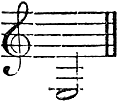
|
||
| to | ||

|
The basso-cantante is a low barytone, or high bass with a lighter quality of tone than the basso-profondo. The alto voice, or counter-tenor as it used to be called, is not a natural voice at all, but is artificially produced by training the falsetto to the exclusion of the other parts of the voice. It is totally distinct from the contralto voice of a female, in quality, average compass, and the style of music best suited to it. It is of more use in part-singing and cathedral music than for solo work, although in some oratorios solo parts have been allotted to it. It is rarely pleasing when heard alone, for very few alto singers are able to avoid the appearance of singing with effort; and the whole performance, except in some instances, appears unnatural and forced. The alto voice ranges generally
| but its best notes are confined to the octave of B flat. |
|
from |
|
|
||
| to | ||

|
Soprano.—The soprano is generally clear, bright, and penetrating in tone; capable, if rightly produced, of "carrying" far without any appearance of force or effort. Its lower register is often weak and ineffective, and the forcing of those notes by a bad singer often damages the voice, and spoils the evenness of tone, which is of far more importance than power and noise in singing. Low notes,[Pg 33] even if naturally weak, may be trained to take their proper share of the work of the voice, and every year will add to their natural power. Most soprano voices have a "break" on

and another, and more difficult one to deal with, on

or

The lower notes are the (so-called) "chest" register; the middle ones, between the breaks, the "falsetto," and the upper ones the "head" notes. I shall speak of these often-used and frequently-misapplied words presently; I merely mention them now for the sake of pointing out to soprani, what many young lady amateurs utterly ignore, that they have these "breaks," and possess "chest," "falsetto," and "head" notes, as well as male singers.
Soprano voices are frequently capable of great flexibility, and passages are easy to them which tax the powers even of a light mezzo-soprano severely. The high notes, especially, are in many cases easily produced in a staccato manner, like notes of a piccolo flute, and an effect is thus made, which, though pretty and pleasing if judiciously employed, becomes a great snare to many singers, who for the sake of astonishing their audience work the upper part of their voices unfairly, and, neglecting steady use and practice of the lower registers, will very soon find that they have weakened the power and thinned the tone of the whole voice.
But there are many voices of pure soprano tone which lack this flexibility: let the fair owners console themselves with the recollection that good sostenuto singing is quite[Pg 34] as pleasing, in the long run, as displays of vocal gymnastics. You may not be able to attempt the "Dinorah" Shadow Song, or the "Rejoice Greatly" in the "Messiah," but you will find that you have plenty of good work left for you in such music as "Dove Sono," "Deh vieni, non tardar" ("Figaro"), or "Jerusalem" ("St. Paul").
Moreover, you may possibly have what is a much rarer gift (in a pure soprano) than flexibility—you may have a tone of voice capable of executing declamatory music with fine effect. Music of this kind is generally appropriated by some mezzo-soprano of high compass, and more properly belongs to voices of that class; nevertheless, the effect of sustained declamatory music, well executed by a real soprano, is unrivalled in its way.
Mezzo-Soprano.—The mezzo-soprano voice is perhaps the commonest of all female voices, and yet one of the rarest met with in perfection. It is fuller and rounder in quality than the soprano—less flexible, and more adapted to a sostenuto or declamatory style. Mezzo-soprano voices vary so much that it is difficult to name any note on which the "break" will be found. Sometimes it is on the same notes as a soprano—sometimes on the same as a contralto—on the average, perhaps, nearer the former. Wherever it may be, however, a judicious teacher will soon point it out, and put the student into the way of rightly treating it. Teaching, and good teaching, is especially necessary for voices of this class, for their fortunate possessors are generally ignorant of the value of the treasure which they possess in a good mezzo-soprano; and if it be of light quality, they fancy themselves soprani, and force the upper register of the voice in trying to "stretch their compass;" or if their low notes develop first, they think that "with practice" they are to be contralti; and by over-exercise and fondness for displaying those deep notes, they run the risk of widening the break, and rendering the quality of the whole voice hopelessly uneven.
What lies within the sphere of a good mezzo-soprano has been shown in late years by a Grisi and a Tietjens, the latter of whom will live in the recollection of all who[Pg 35] ever heard her, as the perfect model for every mezzo-soprano in the production of the pure tone and even quality.
Mezzo-Contralto.—The name mezzo-contralto speaks for itself. It is by no means an uncommon voice, and if used with discrimination is an effective and useful one. Both in compass and quality it lies between the contralto and the mezzo-soprano. Heavier in tone, less resonant, and less flexible than the mezzo-soprano, it is yet lighter than the contralto. Pure contralto voices are so rare that many mezzo-contralto singers appear as exponents of contralto music, and by paying chief attention to the lower register of their voices, they become fair imitations, and more than passable substitutes, for the real article. The possessor of this voice must be guided by the advice of a good teacher as to the direction in which her voice should be trained. Sometimes the natural quality of the voice renders it advisable to attempt rivalry with the mezzo-soprano, rather than with the contralto; sometimes the reverse. It is a question for decision by a competent adviser in each individual case, and therefore I shall not attempt to lay down any decided rule, except my oft-repeated one, "Go to a master, and a first rate-one,"—a point on which I shall have more to say further on. How impossible it is to lay down rules for a mezzo-contralto is shown by the fact that an eminent living "mezzo-contralto" is gladly accepted on our opera stage as a leading contralto, and yet succeeds admirably in such a part as Rossini wrote for a mezzo-soprano of the most florid kind—Rosina in "Il Barbiere."
Contralto.—The quality of a true contralto voice is so peculiar that it is impossible to mistake it for any other voice, although other voices may be mistaken for it. Of course, there are exceptional cases in which the contralto and mezzo-contralto are combined in one voice: the lower range being of full and pure contralto quality, while instead of the somewhat limited upper notes of the contralto, a rich mezzo-contralto range of notes may develop themselves; and in such a case careful training will be[Pg 36] able to soften these two into each other, so that a complete voice of peculiar charm and great usefulness will result. But such cases, if not rare, are certainly the exception and not the rule, the deep and powerfully resonant tone of the true contralto being comparatively seldom met with. There is generally an awkward break between the low B and the D above it in this voice, and E♭ or E are the highest notes within reach of the average contralto. Voices of this class are better adapted for a species of ballads, for solemn declamation, or music of a calm and flowing character, than for elaborate execution or lively melodies. But here again exceptions must be made in favour of those who have the physical means, as well as the artistic skill, to study such music as that of the Page in "Les Huguenots," Arsace in "Semiramide," or "La Cenerentola." For an average English contralto, however, the best line of study is in good songs and ballads, and, chief of all, oratorio music.
Alto.—The alto, or counter-tenor voice, is said by a well-known English alto singer to be "simply a development of the falsetto—generally the falsetto of an inferior bass voice." It is said to be almost peculiar to English singers, and to that fact is ascribed its extensive and effective use in the fine works of the English Cathedral School of composers. Of course, in a voice which is so artificial, there must be expected a worse "break" than usual—the break in this case being the point below which the falsetto cannot be extended, and where the natural "chest" quality of tone has to be used. This break generally lies near the same place as the contralto break—if anything, rather higher—say between C and E in the middle of the voice. The effective notes of an alto usually lie in the octave of B or B♭, and the repertoire of music for which this voice is suited is comparatively limited. That repertoire, however, includes the greater number of oratorios, a good deal of fine old Italian music, and a few old English songs; while a singer of cleverness and cultivation will find many ballads which he may make his own by the help of transposition and style of delivery.
Great pains must be taken by the possessor of an alto voice in the formation and production of a good tone. The voice must be made to sound as natural as possible; and, if necessary, power must unhesitatingly be sacrificed to sweetness. There is great danger of producing a harsh, reedy, or nasal tone, which, to the hearer, is simply distressing or offensive.
Above all, let him be content to develop his own means, and to keep to music suited to or written for his voice. A good alto will make no effect, and will do his voice and style harm, if he "poaches on the preserves" of other voices—tenors, for instance, or basses—(singing the songs of the latter an octave higher). I once heard an alto—a fair singer so long as he stuck to his own work—make an absurd exhibition of himself by attempting the great song "Love Sounds the Alarm," in "Acis and Galatea," at a public concert!
Let him also beware of the snare of contralto music. The alto in a man is totally distinct from the contralto in a woman. The tone is utterly different—the best notes of the one are certainly not the best notes of the other; and although in certain cases a contralto may sing with good effect music written for a male alto (e.g. in some oratorios), yet the converse is scarcely ever true. The low notes, which are so fine in a contralto, and so unlike any other tone except perhaps a few notes of some tenors, are utterly wanting in charm, and generally in power, in a male alto; while the sweet and ringing middle notes of the latter are far more effective in alto music than the (frequently) weak and uncertain middle notes of a contralto. Choose your music as you name your voice, by the quality of tone you can produce, and not by the range of notes.
Tenore-Leggiero.—The tenore-leggiero or "light tenor," is the male voice corresponding to the female soprano; it is perhaps the most delicate and difficult to manage of all human voices. In the present day, when fashion is all in favour of noise, it is difficult for any but the strong-minded to stand firm against the tendency to shout and bawl, which appears to be the highest aim of[Pg 38] many singers, and the highest admiration of most audiences. Now for a light tenor to attempt this style of singing is simply suggestive of the old fable of the frog who tried to make himself as big as the bull, and burst in the attempt. There is a modern school of singing which, though it may be suitable enough for heavy voices such as basses and robust tenors, is fatal to light and delicate voices. The style of singing, and of music to be sung, by this voice, is quite different from that appropriate to strong and full organs; and, if you are the possessor of a light tenor, you must at once rid yourself of the common amateur fancy (a fancy, too, by no means confined to amateurs) that you must imitate a certain ever-popular living tenor, whose name has passed almost into a proverb as typical of the perfection of English singing. You cannot be a "Reeves" or a "Braham," therefore it is only waste of time and strength for you to try. But there is a great deal of music which neither a "Reeves" nor a "Braham" could sing, which is well within your reach; and more than that, there is a great deal of excellent music which, though you cannot sing it like them, you may render very effective in a totally different style. Very often a pianissimo is quite as expressive as a fortissimo, and grace and sweetness are frequently an excellent substitute for power and force. You must be content to recognize that the latter are out of your reach, and that the effects which you can produce are to be attained by other means.
However, while assuring you that power and force are not given to you, I do not mean to say that voices of your class need be at all inaudible in a space however large. The tone of a light tenor is generally clear, resonant, and penetrating; sometimes there is a metallic ring about it which is extremely pretty, if not forced. I have heard a light tenor, singing at the back of the Covent Garden stage, send his voice clearly out into the great theatre, with apparently more ease than his "robust" friend, who was shortly afterwards vociferating at the footlights.
A light tenor must be careful not to force up the lower register of his voice beyond its natural and easy limit.[Pg 39] The charm of the voice is in the perfect blending together of the lower, middle, and upper registers, and to do this the upper notes of each register should be equally at command, as the upper notes of that register or the lower notes of the one above it. In order to attain this, the change from one register to another should generally be made considerably lower than the place where the real "break" in the voice comes. For instance, supposing the "break" to be on E♭, the singer should be able to change his register as low as B or B♭, and to take all the notes between those two places, either in the upper or lower register, with equal effect.
In voices of this character there is often one note which requires to be made—i.e., which is so naturally defective in tone and quality that it can only be produced effectively by imitating as nearly as possible the quality of the register above or below it. This note is generally E, F, F♯, or (sometimes) G, between the middle and upper registers; and if you find that you unfortunately have such a refractory note, remember not to try and force the tone of it from the next note above or below; e.g., if your bad note is F, do not try to improve it by singing E well and then passing on to the F; but try and form the note from the fifth above or below (whichever it happens to resemble most in tone). Rounden the refractory note—give it a full tone in practising, and produce it well from the chest, letting the sound reverberate from the centre of the roof of the mouth—neither too far back towards the throat, nor too much on the teeth. Your teacher, if he knows his business, will soon put you into the way of this. Voices vary so much that these very general remarks must suffice here; but each voice, if it has its peculiar difficulties, has also, doubtless, its peculiar charm; and for light tenors, rich in both charms and difficulties, the rule is all-important: Do not try to imitate anybody else, but let your aim be to do the best that can be done with such natural gifts as you may have, aided by the best training that you can procure for them.
Tenore-Robusto.—The robust or strong tenor is[Pg 40] the male voice corresponding to the mezzo-soprano of a female. It is not an uncommon voice, but is rarely met with in anything like perfection. A robust tenor voice of large compass and round full tone is a treasure of the utmost value. The fact is, that too frequently the possessor of a good voice of this kind, instead of taking care of it and training it for the future, begins using it too soon, strains and forces it into coarseness, and spoils it for ever. People do not realize that a voice may be strong in quality and powerful in tone, and yet in itself be an excessively delicate thing to keep in order.
Moreover, voices of this kind in their youth frequently resemble barytones, and their owners, fired with ambition to rival some popular barytone singer, mistake their vocation, and shout and bellow on the very part of the voice—the upper "chest" register—which requires the tenderest nursing to fit it for future difficulties. Consequently, when the voice develops with age, and the singer finds that barytone work is too heavy for the lower part of the voice, and that he can without much difficulty extend his compass beyond the barytone limits, he discovers that what he has been using as the top of his voice is nearer the middle of it, and that the mode of using those notes which he has practised is excessively difficult, if not impossible, with those which now lie above them. The result is either the creation of a very awkward "break," which even time and practice can never entirely remove, or else (and this is a commoner case) the same process of forcing which has been employed hitherto is applied to the upper notes, as far as strength can take it! This is the reason why so many tenor singers are utterly unable to produce the real tenor "tone," and sound like barytones forced up to a higher compass. There is no sweetness in the upper notes so produced—nothing but force and noise; while the hapless perpetrator of the howls which represent high notes turns scarlet in the face, and quivers all over with his exertions. I therefore give to tenors of this class exactly the same warning that I gave to soprani:—Do not ignore the fact that you have three, or at all events two, distinct registers of the voice, the (so-called) "chest,"[Pg 41] "throat," and "head." Do not suppose, when you hear a great singer produce on a high note exactly the same quality of tone as he produced on a low one, that he did it exactly the same way, or "got it from the same place," as some people say. The perfection of his training and the diligence of his practice have enabled him to assimilate the quality of one register to that of another so completely as to deceive your ear. The proof that this is true may be found in inspecting a great deal of music written for and sung by the most famous operatic tenors of the past—the singers of that pure Italian school of which so few disciples now remain.
There are notes and passages in that music which no "chest" register could by any physical possibility execute, but some of which have been sung within the recollection even of the "rising generation" with all the effect intended, and with the very tone that critical slang calls "chest notes," (simply because it so closely resembles the tone of chest notes that few, if any, can detect that they are differently produced from the low notes.)
For obvious reasons I abstain from mentioning the names of any living singers, but I can name one, not very long since dead, who attained the highest reputation here as a tenore di forza—whose "chest notes" were chronicled by the newspaper critics, and were the envy of aspiring youths—and yet who has ever been heard distinctly to deny that he ever produced those notes in the same way as the lower ones, and to laugh at the idea that such a thing was possible; and this was Mongini.
I have entered into this at some length because it is a point which is more and more ignored by the singers and teachers of this generation. I might almost say that a school of singing exists the whole aim of which is to abolish the natural upper part of the voice, in order to stretch and force the one lower register up beyond its natural compass. I do not deny that in certain cases a voice results from this treatment which is powerful, effective, and capable of executing a good deal of music with much success and satisfaction to the performer; but for one case where this treatment so far succeeds, it fails[Pg 42] in twenty to produce a voice both pleasing and useful; it is, moreover, in singers trained on this method that we most commonly hear the odious (and involuntary) trembling of the upper notes commonly called the vibrato.
Therefore, to sum up those who find, when their voices begin to form, that the natural quality of their voice is lighter than that of a bass, had better make up their minds at once to give the voice fair play, and let it alone for a time; then consult a good master, or one really experienced in hearing singers, as to what the future of the voice is to be. It is by no means easy always to decide at that early period whether the permanent quality of the voice will be tenor or barytone, and therefore it is folly to try and settle the question for yourself by singing, in untaught style, music which may prove to have been all along unsuited to you. Your patience in waiting till the voice really declares itself will amply repay you afterwards by the absence of the difficulties which too early a use of the voice would have created for you to overcome.
Barytone and Basso-Cantante.—The barytone voice is thus described in Stainer and Barrett's "Dictionary of Musical Terms:" "A voice of fuller quality than a tenor, and lighter than a bass, having a compass partly included in both.... This voice has only been distinguished by name as being of a separate character within the present century. Early writers indicate its existence by the use of its special clef. The term barytone is unmeaning unless it be looked upon as a corruption of barytenor; but it is quite possible it was borrowed from the instrument barytone or bardone, which occupied a place between the tenor and bass viols."
The derivation of the name from "barytenor" is slightly absurd, considering that half that extraordinary word is Greek and the other half Latin; whereas the name barytone is a Greek word, used by Aristotle, and meaning "deep-sounding."
The distinctive character which this voice has assumed
within the present century is due, I believe, to the great
change in the pitch of musical instruments which has[Pg 43]
taken place. In the last century the pitch was so much
lower than that at present in use, that a "high barytone"
was much the same as a "robust tenor." Consequently,
music was not written exclusively for the barytone voice,
its existence as a separate class of voice not being sufficiently
recognized. Gradually, as the pitch was raised,
the barytone separated itself clearly from other voices,
and has now a repertoire of music and a style of singing
of its own; and instead of appropriating tenor music, it,
if anything, has stolen away some of the property of the
bass; for the raising of the pitch which placed tenor
music beyond the reach of a barytone has also rendered
a good deal of music originally written for a bass far more
suitable for a barytone, or at all events for a basso-cantante.
I am well aware that by many musicians the basso-cantante
is identified with the barytone. The distinction is
so slight that it is not worth while to quarrel over names;
but that the two voices are distinct I am persuaded. The
basso-cantante is of fuller and rounder quality than the
barytone proper; less flexible, less metallic in tone, and
generally rather lower in compass. But the method of
using both voices is the same, and for all purposes of
amateur singers no distinction need be insisted upon.
Professionals, however, who have to deal with heavy work
on a large scale, will soon find that there is a good range
of music more suited to the rich voice of greater volume
and less flexibility (which I distinguished as the basso-cantante)
than to the bright, flexible voice which has
something of the tone of a full "tenore-robusto," and
which is the barytone proper. Neither of these voices
is much troubled with a "break," although there is a
perceptible difference between the natural quality of the
lower and upper octaves of the voice when quite uncultivated.
This difference, however, which makes itself felt
 in the region of these notes, is got
rid of in practice without any of
the same difficulty which is encountered
by tenors or contralti in managing the decided
breaks in their voices. The possessors of barytone voices
may therefore be looked upon as having comparatively[Pg 44]
"easy times of it." There is a large repertoire of music
at their disposal, including much of the most popular
ballad music of this century and the last; the voice is generally
a favourite with an audience; the style of barytone
singing is undisputed, and the singer will not find himself
violently criticised by the partizans of a rival school of
singing to that in which he himself has been trained, which
is inevitably the fate of tenors!
in the region of these notes, is got
rid of in practice without any of
the same difficulty which is encountered
by tenors or contralti in managing the decided
breaks in their voices. The possessors of barytone voices
may therefore be looked upon as having comparatively[Pg 44]
"easy times of it." There is a large repertoire of music
at their disposal, including much of the most popular
ballad music of this century and the last; the voice is generally
a favourite with an audience; the style of barytone
singing is undisputed, and the singer will not find himself
violently criticised by the partizans of a rival school of
singing to that in which he himself has been trained, which
is inevitably the fate of tenors!
Only let him avoid the temptation to shout, and to sing up to the very top of his compass at full pitch. Unfortunately, an English audience does like a noise, and appreciates plenty more than beauty of tone. It is tolerably easy for a barytone to be a showy singer, and therein lies the greatest danger to his chance of ever being a really good one. He must be content to go through his training quite as self-denyingly and perseveringly as any one else who is gifted with fewer natural advantages.
Bass.—Of the bass voice less need be said here, not because it is a less important voice than any of the others, but because it is more generally known and better understood. A perfectly pure bass voice is, however, a rare thing. This voice has no upper register, properly speaking; the whole voice consisting of "chest" notes, and not admitting of even the process of developing upper notes of extraordinary quality, which is part of the training of a barytone or a basso-cantante. Power and richness are the chief qualities of charm in a bass, while flexibility and true intonation are the qualities most rarely found in that voice. The young singer who finds that he certainly is not meant by nature for a tenor, and also that with all his efforts the upper notes of a barytone are quite out of his reach, need not be discouraged by any lightness or thinness of quality in his voice from the hope that he may develop into a good bass. The full and rich quality of this voice is later in showing itself than is the case with any other voice, and the young singer must be content to study for some time with the compass of a bass and the quality of a kind of barytone, till Nature puts him in full possession of his powers. Only he must study bass music, and not try,[Pg 45] because his voice is of barytone quality, to sing barytone music. Let him, on the contrary, avoid trying to extend the compass of his voice in the upper notes, and give his best attention to the lower ones. The upper ones will be well within his command in time, and if he will be content to let them alone at first, he may become a truly "celebrated bass;" but, if he persists in shouting at them now, he will never have anything but coarse upper tones, only fit to be heard behind a costermonger's barrow, or in "comic" songs at the Music Halls.
Buffo.—The last remark reminds me that I have said nothing about a class of bass singers very useful in certain Italian and French operas—the buffo, or comic bass. The development of voice with these singers is of less consequence than the study of a peculiar style, a good deal of the point of their songs consisting in the entire elimination of anything like musical tone from many notes and passages. A clever and good buffo singer may very likely be able to sing other music well, but the style is so entirely dramatic and so utterly out of place anywhere except on the stage, that no amateur should ever attempt it, and no professional should appear in a concert-room as the exponent of such music. Therefore, for those who wish to sing, any remarks on the peculiarities of a buffo bass would be superfluous; those who wish to study that line as a profession, for stage work, must learn all that they need from a regular dramatic teacher; while those who wish to execute English "comic" songs, may spare themselves any anxiety as to their voices: if they have any voice naturally, "comic" singing will soon destroy its charm, and that will not matter to them, for the last thing necessary to sing a "comic" song is the possession of a voice of any kind. Therefore, if you have a bass (or any other voice, indeed), avoid "comic" songs, and leave the "buffo" business to those who can do nothing better.
Qualities of Voice, Good and Bad.—It may not be unwelcome to the student to have pointed out to him those qualities of voice which are to be aimed at or cultivated, and also those which are to be avoided or overcome.
The charms of a voice are found among the following qualities: clearness, sweetness, evenness, flexibility, power, extent of compass, variety, brilliancy, firmness, persuasiveness.[1]
On the opposite side must be ranked roughness, huskiness, feebleness (or want of power), shrillness (or want of depth), hardness and want of flexibility, dulness, or want of "ring," &c.
It is, of course, impossible for any one voice to unite in itself all these merits or all these defects; and you cannot give yourself merits which Nature has withheld; but you may marvellously improve what natural merits you have, and do wonders in overcoming any difficulties which Nature has placed in your way.
The voice, and how to use it, is a subject which has troubled many minds, and no doubt this will continue to be the case; but the difficult problem will not be solved by running to pettifogging teachers, who advertise to teach all that is known of singing, and a little more, in twelve easy lessons, without previous knowledge or practice at home, for the small fee of one guinea! Let it be stated once for all: singing cannot be taught in twelve easy lessons, and can scarcely be acquired in one hundred very severe lessons. Therefore distrust at once any one who holds out so tempting a bait to you; remember that there is no "royal road" to singing, any more than there is to the acquirement of any other art; and the person who tells you that he can teach you to do without trouble that which costs great artists the study of a lifetime, proclaims himself, ipso facto, to be a humbug.
Schools of Singing.—There are several so-called Schools of Singing. There is a French School, which for any language but French is bad, and which very seldom turns out a pleasing singer. There is a German School, which is worse, being simply the production of coarse noise. Some people say that there is an English School. I hope there may be some day, but at present its existence is rather doubtful, unless those who talk of an English school of singing mean the Cathedral style—which for solo work is detestable—or the old school of Oratorio singing, with[Pg 48] its Handelian traditions, which was not an English, but an Italian, and the best Italian, school.
In fact, there is but one school of singing in the world, and that is the Italian. Whatever language you wish to sing in, whatever style of music you wish to study principally, you must train your voice, produce it, and learn to use it in the Italian method, if you hope ever to deserve the name of a singer.
Masters.—Of course, in a work of this sort, it is impossible, and would be wrong if it were possible, to mention the names of living teachers: therefore I can only give general hints. If possible, study only under a master whom you know to have lived in Italy, and to have studied there for some years under some good master or in some good Conservatoire—Naples, Milan, and Florence generally supply the best. Possibly, for an English singer, an English master who fulfils these conditions may be better than even an Italian, as he should understand better the peculiarities of English voices and temperaments, and would know at once where the chief difficulties would lie. Let me, however, correct a popular error. A good singer is not necessarily a good teacher, nor is it necessary for a first-class teacher to be able to sing at all. Nor need you necessarily look for your master among foreigners with fine sounding names. There are two or three good teachers of singing in this country who are foreigners; but there is also some native talent equally capable of teaching singing, as it is accepted in this country at the present time. These know the English style better than any foreigner can teach it, and after all, style is the chief consideration.
Institutions.—As we have no real English School of singing, it is perhaps fortunate that we have no Conservatoire. There are, however, Institutions accessible to those who cannot afford to have masters at home or to place themselves under a private teacher. Of these, the chief is the Royal Academy of Music, in Tenterden Street, Hanover Square. There is also the National Training[Pg 49] School of Music, the London Academy of Music, also the Guildhall School, and there is Trinity College, London, where I believe singing lessons may also be obtained. To all these establishments singing masters, more or less good, are attached, and it is open to any one to obtain admission to the concerts given from time to time at the institutions themselves, and to form some kind of opinion as to the teachers from the performances of the pupils. It would be well for an intending student to do this, for of course at any institution where there are several professors, one might suit you and another might not; it is even conceivable that one professor might do all for you that you could possibly require, while another professor might be an ignorant charlatan. Therefore, hear their pupils and judge for yourself, making inquiries at the same time of musical people who are qualified to express an opinion on singing. I must not, however, withhold from my readers my conviction that private lessons are better and more effectual than those taken in schools and academies. The terms at these public institutions are such that they preclude the possibility of more than twenty or thirty minutes being devoted to each pupil, and that is not a sufficient time to bestow upon a lesson. Forty-five or sixty minutes are needed to give a good lesson; and the pupil who pays fifteen shillings or a guinea for this, does a wiser thing than the one who pays a fourth of that sum for, say, twenty minutes' attention.
A First Opinion.—The actual successful teachers of singing in London may be counted on the fingers of one hand, and those who are qualified to teach singing, but who are not specially successful, may be found on the remaining five fingers. Each of these professors would probably not take less than one guinea the lesson, and it would, honestly, be far cheaper in the long run to pay this sum for one good lesson in singing than it would be to have fifty lessons founded upon wrong principles, even for nothing. And for this reason: teachers of this calibre will not trouble themselves about you or your guineas unless you have a promising voice, some general musical talent,[Pg 50] and show signs of becoming, to some degree, a credit to your teacher, for to these men guinea pupils are very plentiful, and it is only reasonable that a guinea from a clever pupil should be worth considerably more to a sensitive artist than the same amount from a fool. Therefore, a first opinion from one such teacher may save your spending money, time, and energy on a pursuit in which you can never succeed.
Bad Lessons.—Never take a bad singing lesson till you know how to sing. You may then do so (if you care to), and learn the "how not to do it" of singing. It is commonly supposed that the earliest singing lessons may be administered by any "dabbler," and the last touches given afterwards by a "finishing master." Never was there a greater error. Pay your guineas first, and your shillings afterwards. If you cannot afford to have good instruction in beginning to sing, you will be still less able to take it afterwards, for artistic reasons. Remember that every bad singing lesson which you take hardens old faults and creates new ones, and, moreover, takes you farther and farther away from your original starting-point. So, when you begin under the right man and the right method, you have to undo all this that you have expended toil and money to acquire.
Bad Teachers.—It is astonishing how much money is wasted by people who want to sing, through not going at once to the fountain-head for the necessary training. Because a man is a musician many people conclude that he must necessarily be able to teach singing! Such an idea is scarcely less monstrous than that of a man being a good physician and consequently competent to amputate a limb, or to take out and reset an eye. Do not follow this "multitude to do evil." Be as careful in inquiring about your singing master as you would be about your doctor. Both in London and in the country there are "professors" whose knowledge of singing stops at professing—the class of people who (very likely) keep a music-shop, tune your[Pg 51] piano, play polkas and waltzes for your evening parties, and have a brass plate on their doors to this effect:
|
Mr. Handel Moscheles Ignazio Jones, professor of the pianoforte, harmony, the violin, italian, and singing. |
All honourable professions, no doubt; but to profess to combine them all is dishonourable, and insulting to the common sense of those who know anything of any one of the subjects professed. A singing master, if he is worth anything, must be a man of one trade—singing. For the teaching of singing is a "specialty," and the man who can teach it properly is not likely to be a man of all (musical) work.
Books of Exercises, &c.—There are numerous "Singing Tutors" published, giving rules, exercises, solfeggi, &c. Many of these are excellent, and some nearly perfect. But all alike are useless or worse than useless to the tyro, without a master. You might as well suppose that a child could learn to be a carpenter by having some fine wood and a box of good tools.
I have before observed that voices vary as faces do; no two are exactly alike, each voice having its peculiar merit and its peculiar defect. Now, a good master will treat each voice on its own merit, and not place it at first on the Procrustean bed of a book of rules and exercises. He will probably write down his own exercises expressly for his pupil, and if not that, he will select certain exercises from the book, and forbid others to be attempted for a time. You must also let your master select such a book for you, so that you may have one in which the rules do not contradict those which he has already given you verbally, or else you will be perplexed with a multitude of counsellors.
It is not till a certain stage in singing has been reached,[Pg 52] under the training of a master, that any book of exercises can be of service to you. When that stage is reached, you will find such a work of great use in a part of your labours. Among such books may be named as especially good,—Concone's Exercises, Righini's, Guercia's, Nava's, Lablache's, and Lamperti's; but, again I say, do not choose for yourself. There are some excellent rules, as well as some good exercises, in an old work of the kind by Crivelli, and also in "Singing Exemplified," a work by T. Cooke. If you can meet with these, secure them—although I fear they may be long since out of print—for in the literature of singing the new is by no means certain to excel what was written in the days of our best composers and singers of operas and oratorios.
Remember that the voice is of all instruments the most difficult one to study, and to bring perfectly under control, especially for the first year or two. Do not attempt to cultivate it with the view to professional remuneration, unless you can set apart at least two hours daily for most careful study, and can also afford to wait at least eight or ten years for any substantial pecuniary reward for your labours.
Individuality.—It is of great importance to bear in mind that no two voices are exactly alike. To some singers is given quality of voice, to others quantity. And for each alike, steady, well-aimed, and well-ordered practice is indispensable. But, whatever you sing ought, like your voice, to have some touch of individuality: the song should seem to come naturally from you, and to be the spontaneous expression of your thoughts. At the same time you must not lose sight of the all-important guide which you have in the composer's intentions and wishes. Remember that a small and delicate voice may be made to go as far as, if not farther than, a voice of large volume and long compass. By judicious management, by touching expression of the softer feelings, by careful selection of music to be performed, the obstacles which are placed in a singer's way by want of power may be effectually removed, because the audience will irresistibly feel the influence of the singer's individuality. The difficulties of the singer who has the gift of quantity rather than quality[Pg 54] of voice, are in some respects greater, because the necessity for thus impressing on his audience a sense of his own individuality is not so strongly forced on him by circumstances. Not only has he to labour to attain a good quality of tone, but he must also resist the temptation to fancy that "might is right," and that the "sensation" caused by a powerful voice is all that he need aim at. And here let me say, the way to get quality is to listen as often as possible to some leading singer of your own kind of voice. Try and imitate his tone; but above all practise with a medium tone—a mezzo-voce—listen for the beauty in your tone, and think of what you are doing when practising.
Perseverance.—The surest means of improving and strengthening the voice is by constantly exercising and practising it. Just as the muscles and fibres of the legs of a pedestrian are increased and made capable of great exertion by careful training, so is it with the nerves and muscles of the throat. With judicious training, the compass of the voice is extended, its quality is improved, its tones grow rounder and firmer; and, if the master is a good one, and the pupil is willing to study patiently for some time, never resting content, but always aiming at further progress as year succeeds year, he may not unreasonably hope to attain a well-earned place in his profession, and its attendant reward.
Facial Expression.—A looking-glass should form a part of the furniture of a singing student's study, for it is most important to watch the face—its features and expressions—when singing; and it is none the less useful for insuring the constant right position of the mouth. In respect to the facial expression when singing, there is a very great tendency to look too serious, too severe, and too hard when earnestly studying. Now, a cheerful and good-humoured expression does not necessarily imply carelessness, and it is far more agreeable to the audience than an anxious and troubled look. Some people look quite savage when singing; and when rendering passages of love and tenderness, their features are far more indicative[Pg 55] of rage, revenge, and murder! And this very common fault is generally quite an unconscious habit. It is only to be remedied by constant care, and to this end practice before a looking-glass will be found very helpful.
Position of the Body.—How to stand when singing has been explained by a great number of writers on the subject, and most of the explanations given have been chiefly remarkable as being entirely erroneous and false. The body should not be kept in a perfectly upright position, as it is (too popularly) believed that it should. The best position is when the body is well collected, with its chief weight upon the right leg and foot, with the head gently leaning forward, and the arms and, indeed, the whole carriage disposed in that manner which would indicate to the audience a sort of desire on your part to persuade them and bring them over to your feelings and sentiments. When the right leg begins to tire with the weight of the body, the left leg can take its duty, when the right may be gracefully drawn back as in dancing. The best lesson on this subject, however, can be gleaned by carefully watching the pose of a good Italian singer during singing.
Self-Accompaniment.—A sitting position is a very bad one in which to practise. All singing should be done in a standing position, and the student is strongly urged to adhere to this rule. Instead of sitting at the pianoforte, and accompanying an exercise or "solfeggio," it is far better to sound the first note of each passage therein, and master the same without any accompaniment. The advantages of this mode of practising must be obvious; but one of the most important is, that the attention is not divided between the pianoforte and the voice, while it leaves the singer free to give all his attention and care to the production of the notes which he is endeavouring to sing artistically.
Position of the Arms.—I would urge upon the[Pg 56] student to hold a piece of music in his hands while he practises. There is a place for the hands when singing in public; but this place is neither the trouser-pockets, nor on the hips, nor behind the back, nor across the chest, but rather that position which is secured by leisurely holding the music-sheet, not as if actually singing therefrom, but as though it were merely intended for reference, if required. This easy attitude not only gives the hands and arms their legitimate position, but also lends a grace and freedom to other parts of the body, all which points must be attended to in singing. Remember to keep the arms well away from the body. Some singers stick the elbows into the waist, as though to give support; instead of doing which, they hinder the free action of the lungs, besides giving an awkward look to the whole figure.
Position of the Hands.—Do not let your hands hang down, but keep them well before you, in some position which allows of your turning the palms uppermost. In this way you (as it were) lock the joints of the shoulders, and put a check on the tendency to raise the shoulders, which is an invariable consequence of taking breath wrongly. Keep your shoulders well back, your elbows depressed, and your hands with the palms uppermost, and you will find it difficult, if not impossible, to indulge in the vice of heaving the chest and shoulders up and down, like the piston of a steam-engine!
Position of the Throat.—One of the first conditions of singing well is to keep the throat open. To have the throat in its proper position the tongue must be kept down, and hollowed like the bowl of a spoon, its root being well depressed. Nor must the throat ever be allowed to screw itself up small, a common failing of many singers whenever they approach a high note. Most of my readers have yawned once or twice in their lives: if they will do it once more, in front of their looking-glass, and watch the inside of the mouth as they yawn, they will see and feel the exact position in which the throat should be during good singing. It will be useful to repeat this proceeding[Pg 57] until the mind is thoroughly impressed and the memory familiarized with the feeling of the mouth and throat in this, the correct position for singing.
Position of the Throat, &c., in Soft Singing.—When singing softly, or piano, as it is called, take great pains to keep your throat as open as you would for singing loudly, leaving it entirely to the mouth and lips to keep the tone soft, yet steady and firm. Do not forget, too, that in soft singing it is a great advantage to keep the mouth in a smiling position.
Position of the Tongue.—The tongue, while being so useful, is nevertheless a very unruly member in singing. It has so great a tendency to get out of its place. Its legitimate office is to rest quite flat, or even hollow, in the bottom of the mouth, with its root well down, as this keeps the throat-passage clear, and with the tip of it just touching the lower teeth. Get a looking-glass, and continually watch the position of the tongue. Never allow it to roll up or turn about when singing, or the effect produced will be scarcely worth repeating. The tongue should occupy the least possible space in the mouth, and this is the case when the directions here given are carried out.
Position of the Larynx.—The larynx, or upper part of the wind-pipe, plays a most important part in singing. Upon it depends all the beauty, and quality, and richness of the voice. The singer will do well to constantly think about the larynx, to watch it, to feel that it is well down below the mouth before commencing the first note of a song, which note must, under such circumstances, be rich, round, and penetrating. Then the larynx must never be allowed to rise above this fixed point. It may be deepened, and must be, for the higher notes, but it must never ascend, or nearly approach the roof of the mouth, or the sound-passage is closed, and the sounds become at once impure, vitiated, and without body or foundation.
Try and guard against the bad habit of pushing forward the chin when singing, otherwise the tone cannot fail to be faulty. The chin should be well down on the chest,[Pg 58] and the larynx quite low, to lead to an easy and pure production of tone. To be constantly moving both the jaws for every note, continually displaces the larynx, impairs the purity of the tone, spoils the articulation of the words, and, what is worse than all, produces a hideous expression of the features, which latter fault would alone be sufficient to prejudice seriously the chances of any singing artists. The lower parts of the jaws, not the upper ones, should do the work; and when a high passage or note is before the singer, the lower parts of the jaws should be exercised to drop as the notes increase in height. The singer's face should be controlled, if no other member can be so regulated.
Singing in the Head.—There is, in all beginners, a tendency to sing too much in the head, that is, to have the foundation of the tones too high up in the throat. This fault is due to the difficulty experienced by beginners in keeping the larynx sufficiently below the mouth. The fulness of tone, the rich, round, and mellow quality which is so much admired in all good singers, is almost entirely owing to the voice being pitched low down, and not high up in the throat, towards the back of the head (as it appears to be).
A few trials of this will soon convince the student of the vast difference in the character and timbre of the tones of these two ways, and also of the economy of the plan here recommended, so far as regards the wear and tear of the voice in practice.
Throatiness.—Throatiness, or singing in the throat, is the common enemy of all English singers. Our language is the chief cause of this disagreeable habit, which we begin to acquire as soon as we learn to talk. Still, by diligence, the evil can be cured, and no better plan can be followed than to constantly practise singing the vowel-sounds Ah, A, E, O, throughout the compass of the voice, taking every possible care—and this is the point—never to allow the tone to vary, nor to leave the teeth, and not to screw up the throat, especially in high notes. It is[Pg 59] impossible to produce a "throaty" quality of voice if the throat is well open, and the tone is firmly directed, and kept on the upper teeth and front of the mouth. On the other hand, if the student screws up the throat, rolls the tongue, or practises singing without being constantly on the look-out for the "voice on the teeth," the result must be a "throatiness," which is most disagreeable to all people who have any real knowledge of what singing should be.
Clearing the Throat.—Singers, good and bad, are often troubled with an apparent stoppage in the throat, and this inconvenience seems to be at its worst just at that moment when they wish to sing. To displace or to cure this stoppage, they begin hacking and coughing ("clearing the throat" as it is called), which proceeding, however, only makes bad worse for the time being, and finally grows into a habit, till at last such people cannot venture to open their mouths without first subjecting the throat to a series of these irritating "hacks." A good master will soon cure this complaint by refusing to continue the lesson whenever the pupil gives way to the bad habit. It is in many cases simply a nervous trick, and if the singer will accustom himself to swallow instead of coughing, whenever he feels the sensation of which we are speaking, he will soon get rid of it. If it results in any case from real weakness of the throat, it may be beneficial to gargle three or four times a day with moderately strong salt and water, especially before singing. This does no harm to the voice, and by bracing and strengthening the muscles of the throat renders them more obedient to the singer's will.
High Notes.—Many people find great difficulty in counting, with any degree of certainty, upon the top notes of their register. I know of no greater assistance towards bringing these out than that of well contracting the mouth and lips at the beginning of the passage in which these high notes occur, dropping the lower jaws, and securing a good play of the mouth as the highest note is reached, at the same time keeping the throat as open as possible,[Pg 60] ejecting the sound to the audience with as much "lip-force" as can be secured, being careful that the tone is safe "on the teeth" before the note is "opened."
The Scale.—There can be no doubt whatever that the grand groundwork of all singing is the diatonic scale. On it is built all the graceful forms and figures which belong to the great artist. Yet how few seem to know and to appreciate this fact! To excel, the diatonic scale must be practised most seriously and assiduously in its plain and simple form; nor must it be left until the student can sing every note therein purely, without wavering or flutter, and with precision, in the soft, medium, and loud voices.
Forte, Mezzo-Voce, and Piano.—The singer will derive much advantage by bearing in mind that the voice has three main gradations which the Italians class as the forte, the mezzo di voce, and the piano. The management of these three is of vital importance, and the singer should certainly practise the scales in all three voices, and have each at command for every exercise and passage which he studies.
Tone.—The tone of the voice must never be vitiated or rendered impure from any cause whatever. There is always a danger of this in passages of great energy and passion, but it should be remembered that whatever be the effect aimed at, it cannot be attained by any means which involves a change in the tone of the voice. The first and chief consideration must always be to produce a good tone in the right manner. If the tone be not good, the singing cannot be agreeable; and if it be not produced in the right manner, you have no security that it will be equally good throughout the voice, or in passages of all kinds.
Chest, Falsetto, and Head Voice.—I have already said that there is a good deal of confusion existing as to the use of the terms "chest," "falsetto," and "head voice." And this is scarcely to be wondered at, seeing[Pg 61] that nobody has yet decided how the three qualities of sound are produced, while everybody knows that the names are so far misleading, in that no sound whatever is really made in the chest or in the head, but that all are due to the passage of air through the larynx, in which are placed the vocal cords upon which the air plays. The changes of sound which are spoken of as "chest," "falsetto," and "head" voices are due to changes in the position of the larynx and its surroundings, and in the action of the vocal cords. What those changes are, and how or why they cause the results which we hear, has yet to be discovered: there are several theories, but no one has yet ventured to claim the certainty of truth for any one of them. There is an excellent article on "The Larynx" in Stainer and Barrett's "Dictionary of Musical Terms," to which I would refer those who wish to understand these various theories. For my present purpose it is sufficient to point out that each of the names is an utter misnomer. The "chest" voice is probably so called because the vibrations of the notes in that register may be distinctly felt in the chest; and because the breath passes directly from the chest, as it seems, without any opposition in the throat, producing the sound on its way. The "falsetto," or range of notes above the chest, is so called (and rightly so) because in that register of voice the tone feigns, or imitates, the tone of the "chest" notes below, although it is certain that the sounds are not produced in the same way, for the position of the vocal cords and their attendant parts is different, and changes suddenly on the passage of the voice from the chest to the upper register. A falsetto, rightly trained and used, is one, therefore, which is true to its name, and so well imitates the "chest," that the hearer cannot distinguish the "false" from the real "chest tone." The "head voice," which many people persist in confusing with the falsetto, is so called because to the singer it feels as though the notes so produced came from the head. This is due to the larynx itself rising up in the throat and approaching the back of the head. It comprises, in reality, all that part of the voice which lies above the "chest" register, all the lower part of it being shared by the[Pg 62] "falsetto," exactly as the falsetto shares the greater part of the chest register. The falsetto, therefore, belongs to both, and its use is to carry, by its power of imitation, the tone of the lower or chest register into the upper or head register, so combining them that no audible change of quality, or "break," is perceptible.
Scale Practice.—It cannot be too strongly impressed upon, or too frequently pointed out to, the singer (no matter what may be the stage of his or her artistic development) how desirable and advantageous it is to be constantly singing exercises and solfeggi in preference to songs. It is a popular fallacy, especially among amateurs, that the practice of scales and intervals should be left behind as soon as possible. Pray do not be mistaken. The never-failing daily practice of singing open chords in solfeggi, scales, and exercises, is fraught with advantages which cannot be gained by the study of yards, or even miles, of song tunes. As an instance of how much may be done in the study of scale practice, the writer would point out that this particular exercise should not be left until the student can sing the diatonic scales throughout the whole extent of the voice in one unbroken breath, and with one quality, character, and volume of voice. When this point has been reached, its peculiar efficacy will be so apparent as not to require any recommendation or advice for its daily continuance.
First Exercises.—This is a book of advice, not of exercises, nor do I profess to teach you, but only to point out to you, how you must prepare to be taught. I cannot too often repeat that no book by itself can teach you singing, and my object is not to supersede a master, but to induce you to place yourself under a good one. However, it may happen that circumstances of time, place, or pocket prevent your doing so as soon as you would wish, and it is far better even to learn from a book what you can in the way of rules and exercises, than to go on singing by the light of nature, or under a cheap and inefficient master, or working at exercises too advanced for a beginner (which is as bad as not working at any at all). I therefore give[Pg 63] here a few simple but most important exercises, which you may work at until you are able to place yourself under the care of a good master. Bear in mind, first, all that has already been said here about taking your breath, the position of standing, the form of your mouth, and place of throat, tongue, teeth, &c., and study the following exercises daily say to the extent of thirty minutes three times a day, with full attention to all the above points:

Sing this fully and firmly. It should be begun and ended with the same quality and "thickness" of sound, as suggested by the even line over each note. You should be able to hold each note out in one breath for twenty seconds without the slightest alteration being perceptible in the tone, any more than there would be if it was a note proceeding from an organ-pipe. Practise it on each of the following sounds consecutively: "A" in "Bard," "A" in "Fate," "E" in "Steel," "I" in "Life," "O" in "Pole," "U" in "Rule," prefixing each sound by L, and so singing Lah, Lay, Lee, Li, Lo, Loo. In singing this first exercise, which for basses and barytones will be, of course, an octave lower, be careful not to force the lower notes, and do not seek to get a powerful tone thereupon. The tone does not need to be full and heavy on these notes, but rather should be a well-produced, light, and thin quality of note. The way to proceed is: (1) To inspire the breath from the bottom of the lungs as it were—not raising the shoulders. (2) Steady the breath for a second or so in the chest while you THINK the note you are about to sing, and while you prepare your throat and mouth for singing by lowering the larynx and opening the throat. (3) Then begin to sound the note—not from the back of the mouth, but from the tip of the tongue and the front teeth—thus taking the whole of the tone out of the mouth, which is what is required to be done. Sustain the note till you have only a little breath left—then finish[Pg 64] off in a clean manner, and allow the remaining breath to leave the lungs and body in an orderly way.—Repeat the same operation for every note, and if you desire to make progress, give a minute's attention of this kind to every single note.

and so on, rising by semitones until you come to this:

which is certainly the highest that you ought to attempt at present.
Exercise No. 2 is a first step towards joining notes, and is another difficulty in the matter of production. The object to be aimed at is to sing the two notes which are bound (or tied) together with the same breath, and the same body and quality of tone. To step from C to E, the first movement in the exercise is to raise the voice a major third; but the student must pass from his mind any notion of raising the throat in order to sound the higher third. As the note E is higher than the C, the tone of the former must be generated lower in the chest than had been the case with the C. The higher the note to be sung, the lower must be its generating-point in the chest. This is the only way to open the voice, and I need scarcely say that it produces an entirely different tone and method than are secured by the common habit of screwing and tightening the throat, in proportion as the notes ascend in pitch.
Another good exercise which may be combined with the last-given is the following:
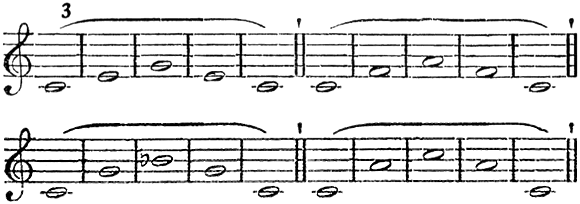
This exercise (3) must be sung in the same manner as indicated with No. 2, care being taken as each note gets higher to pass under the preceding note, and not as it were to generate a high note over a lower one.
After which you may take this:

but sing it very slowly and deliberately, bearing in mind the production of the high notes.
As you begin to get all these notes firm and round, you may take these same exercises in D, D♭, and E♭, but be very careful not to force the upper notes.
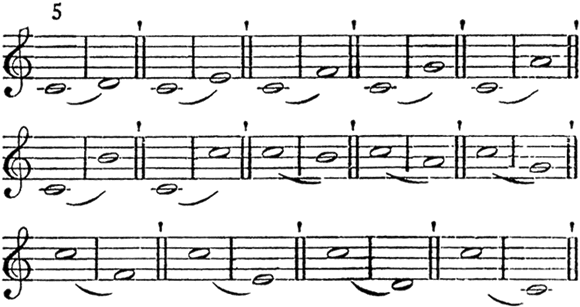
Exercise 5 is one where the question of the breath and its proper management becomes of vital importance. The reader will observe the notes are bound together, and the student's attention should be turned towards passing from one note to the other, without any appreciable difference in the quality—I do not say pitch—of the tone. Having inspired in the manner already explained, the[Pg 66] singer will sound the Do with a pure, sympathetic, not harsh or forced sound; and by pressing down the breath, will lift the voice on to the Re. When he has succeeded with the step of a second, he can go on to the step of a third, fourth, &c. The care must be to utilize the breath, always supporting the tone with the breath. If the sound wavers, then there is something wrong with the breath. You are either singing with too little, or are forcing the breath.
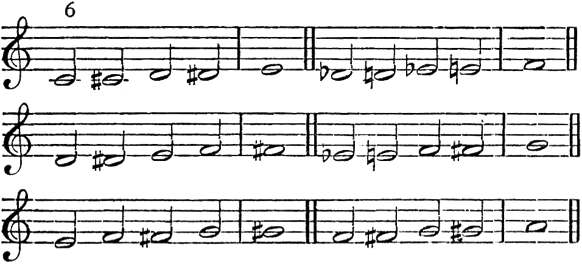
And so on.

And so on, descending the scale by semitones.

Practise No. 8 slowly and steadily, with perfectly even tone throughout, without any crescendo or diminuendo.
Let all the above exercises be taken successively, forte, a mezzo-voce, and piano, preserving exactly the same amount of tone throughout each passage, and holding the notes with the same force with which you attack them steadily to the end, not letting them die away. The trick of letting notes die away is easily learnt afterwards, but at present you have to master the far greater difficulty of holding notes firmly with unvarying tone. Practise these exercises on all the vowel-sounds already given. All such exercises are of course only variations of the diatonic and chromatic scales, so arranged as to prepare the voice for executing those scales evenly and perfectly, with equality of tone on every note; for till you can sing scales, you are not fit to sing songs of any kind.
Duration of Practice.—Always guard against over-straining and over-working the voice. Do not sing or practise for a longer time than half an hour without allowing the voice rest for some time. If you have three hours at your disposal daily to devote to singing, the most economical use of the time is to divide it equally between the morning, afternoon, and evening.
Singing in Tune.—Correct intonation is of the greatest possible importance in singing. Every singer should pay especial attention to this point. The heavier the voice, the more necessary becomes such attention, and therefore contralti and basses are strongly advised to lose no time in facing this (to them) considerable difficulty. Deep basses, indeed, are rarely perfectly in tune for any long time together, and some of the most famous bass singers have left behind them recollections of this painful defect. Therefore, whatever be your voice, do not take for granted that even the possession of a good ear will always ensure your singing in tune. Sometimes excellent singers, and good musicians too, will sing out of tune,[Pg 68] perfectly aware that they are doing so, but, for a time, unable to prevent it from physical causes—relaxation of the throat, fatigue, indisposition, &c., under which conditions the muscles are unable to obey the will as usual. Do not, then, make too light of this matter, because you may think yourself quite incapable of singing out of tune; it is at all events wiser to be on the safe side. Therefore, never practise (nor sing, if you can help it) with a pianoforte which is not well in tune and well "up to pitch." And be very constant in practising intervals, such as major and minor sixths and sevenths, so as to be able to strike them as perfectly in tune and as unvarying in quality as the notes of an organ diapason.
How to Begin.—Many people never make a good start when beginning to sing any piece. Now a very good remedy for a part of this evil is not to prepare yourself too soon. Use the bar immediately preceding that in which your part commences to gather up your faculties, and, to use a common phrase, "to pull yourself together;" then let the muscles of the body gently settle down. The ease and freedom acquired by this momentary call upon the system is very remarkable; and for the singer especially the hint cannot be too often acted upon.
Variety Indispensable.—An unchanging volume of sound is very soon wearying to the ear; and therefore a singer who scarcely ever varies the pitch of his voice will find that however loudly he may sing, his audience will have a feeling of dissatisfaction, as though they could not hear him distinctly—the fact being that their ears, being fatigued with the uniformity of the noise, cannot do their proper work, and the attention therefore flags. One great secret of being agreeably heard by an audience is to vary the body of tone (not the quality of it, observe). As a rule singers are left tolerably free to do as they like in this respect. Composers of songs rarely give them any help in the matter. In fact, nowadays so many people compose "vocal music" without knowing anything about the vocal instrument for which they compose, that it is not wonderful[Pg 69] that they ignore their power of helping the singer by properly combining duly marked forte, piano, and mezzo-voce passages, so as to ensure a variety of effect. Therefore, in most modern music, a singer has to take his own "reading" of a song, and to make it as effective as he can by varying the power of his voice. It might even be taken as a rule that every forte passage should be succeeded by a soft one. The voice should rise and fall, and be varied in its inflexions in that agreeable manner which is so marked in good orators and dramatic elocutionists.
Chorus Singing.—If you are studying seriously for solo singing, you must discontinue all chorus singing, especially during training. Singing in church choirs and choral societies must be abandoned. And this not because there is no good to be learned there, but because the little good is by no means commensurate with the great amount of harm which is acquired along with the good. To enumerate here all the evil habits so easily learnt would be impossible. Not the least of them, however, is the tendency to shout louder than your neighbour, to use yourself to the bad habits of those on each side of you; to produce a bad tone; to "chop" the passages instead of phrasing them; to attack notes carelessly; to sing coarsely; to depend on others; to get into a machine-like regularity of rendering the music. All these evil habits are the result of chorus singing; and while many of them are detrimental to the voice itself, it may be safely said that any one of these habits is fatal to good solo singing.
Humming.—Some people have a wretched habit of continually humming tunes. Pray do not get into this habit of singing unconsciously—than which nothing is more prejudicial to the voice. You should never sound a note without being perfectly aware of what you are doing, and that it is being done in the right manner. The faults acquired by "humming over," as it is called, are of the worst kind, and, moreover, they are far sooner acquired than eradicated.
Studying Songs.—Be careful, in studying a new song, not to waste either time or strength by a trifling and superficial treatment of it. "Whatever is worth doing at all, is worth doing well." First of all, sol-fa the melody a few times in a full mezzo-voce. Then study it with rather stronger tone, paying attention to lights and shades, yet at the same time being chiefly occupied with the melody itself. Then make your breath-marks, and adhere to the same unfailingly. Then sing the melody once throughout, in order to find the weak places; having found which, you need no more practise the whole of the melody, but give all the attention to these latter phrases. Having mastered these, the melody will be complete. It will then be necessary to determine where the notes shall be made to bend into each other, to add the nuances, a few graceful figures and effects which belong alone to the true artist.
Imitation.—By no means the worst lesson which you can have will be gained by imitation of some acknowledged first-rate singer, whose voice is of the same kind as your own. Before going to a concert at which any such artist is announced to sing, procure copies of his songs (if possible), and make yourself acquainted with the compositions first of all. Then go and hear how those works are rendered by the singer who is to be your model; listen with your copy in your hand; make notes of any points which strike you, and while the impression made upon you is still fresh, go home and imitate them as closely as you can.
General Musical Study.—If you want to be a good singing artist, many more things besides singing should be studied. You should be sufficiently acquainted with the pianoforte to play your own accompaniments, even of the most difficult songs, well enough to get an idea of them. Then a knowledge of harmony, counterpoint, and orchestration is of the greatest value. The study of the best scores, orchestral and vocal, should not be neglected, and further, the student should make himself or herself otherwise familiar with the rise and progress of the art, by reading all the best books on the subject, whether historical, critical, or biographical.
The study of language, articulation, and deportment, the gradual formation and building-up of the singing voice, and the incessant practice of scales and exercises, are in reality only the necessary preliminaries to singing itself. Singing, or the proper use of the voice combined with the due enunciation and expression of the words, is nothing unless due attention be also paid to style, to the fit and effective execution of the music selected, due regard being paid both to taste and tradition.
Traditional Styles.—Although the groundwork of all good singing is the same, the music to be sung varies greatly in style. There is church music, oratorio music, and opera music, as well as ballad music; and a certain nondescript—half recitative, half declamation—which is of modern growth, gives pleasure to many people (both performers and audience), and comprises the greater number of modern German "songs."
Modern German Lieder.—This latest development of vocal performances, of which I desire to speak with all due respect, has no traditions whatever, but it has a style, decided, though (in my opinion) bad. It has, however, one merit: it imperatively demands that the singer should understand the meaning both of words and music, for the whole thing depends on expression and modulation. The composers of these works generally do their part fully in the way of modulations and accompaniment;[Pg 72] but as they frequently forget to supply anything in the shape of a melody, the singer must do his best to touch or move his audience by his expressive delivery of the words in the musical inflections which (with this class of composers) occupy the place of a "tune." However, if you admire this kind of music, and have been properly taught to sing before you attempt to execute it, I have not a word to say against it: so long as you use your voice legitimately, this style of music can do you no harm, and if you study dramatic expression and elocution properly, you may doubtless produce an effect very pleasing to others who admire it. But the danger of such music to the untrained voice and untaught singer is very great indeed; and I do not hesitate to say that the frequent performance of it by such an one must result in the ruin both of voice and style.
The Cathedral School.—The one point in music wherein England has just reason to boast of her past, is the existence of a distinct class of music composed for her church service, and that music of a high order of merit. Distinctive in character, this church music—"services" and "anthems"—has created for itself a distinct school of singers, and, by tradition, demands a distinct style of performance. I have elsewhere stated that the "Cathedral School" of singing is "detestable for solo work," and so it is for any solo work except cathedral solo work, where the operatic or oratorio style of singing would seem to us, who have always been familiar with the traditional and one accepted style, out of place, and irreverently suggestive of the concert-room. It is difficult to describe upon paper the peculiarity of this style of singing, and it could only be learnt by imitation in its own home, the cathedral. Its chief characteristics are a sort of passionless "statuesqueness," a steadiness of tone akin to the notes of the organ, which is its only fit accompaniment, an absence of all attempt at personal display on the part of the singer. Its faulty tendencies are towards deficiency of expression and slowness of "attack;" these are apparent, generally, when a "cathedral" singer appears in the concert-room; but[Pg 73] in church, the pervadingly reverent character of the performance takes off the impression of coldness and tameness in the individual singer, while the ear, accustomed to the slight difference in time with which the various organ-stops "answer," does not notice in the singer that want of "crispness" in the time which the accompaniment of an orchestra reveals at once.
Unless you are really intending to sing professionally in a church or cathedral choir, the study of this style will not be of much use to you; you will find its good points equally insisted on in the oratorio school of singing, while its defects should be avoided in any. For English part-singing there is, however, no training so good, its traditions being exactly those of the finest old English secular part-music—the madrigals of Wilbye, Weekes, and Purcell, &c.
Oratorio.—By oratorio singing—speaking of it as a distinct style—I may say at once that I mean the school of Handelian singing, of which the traditions are distinct, and which has only been slightly modified to suit the more modern oratorios of other composers. Of course, Mendelssohn cannot be sung exactly like Handel or Bach, but the general style of delivery should be the same, and till you can sing Handel, you cannot hope to be able to sing Mendelssohn. The ability to sing Handel, Bach, and Glück, I believe to be the sole foundation for a pure style of singing either in opera or ballad music: the music is such that it cannot be trifled with—the difficulties cannot be evaded, but must be mastered—while the exquisitely smooth and vocal character of these great masters' music trains the singer to an evenness and solidity of style which is most valuable in any music that may be afterwards attempted. Moreover, the songs of Handel form an admirable school for the training of individual taste and judgment in the introduction of ornaments, the variety of phrasing, and other minute details of finish. Not that you may exercise your individual taste in introducing ornaments into Handel or Bach—far from it; but the songs are written with the express intention that certain ornaments should be introduced in particular places, and the style[Pg 74] (and in many cases the notes) of these ornaments has been accurately handed down to us; therefore, in learning this traditional manner of singing such music, the student is trained to a knowledge of the appropriate place for the introduction of ornamentation and "grace"—the appropriate character of such embellishments, and the appropriate opportunities for introducing them. For instance, most of Handel's songs commence with a movement which is intended to be repeated at the close of the song, the middle part being generally a movement in some relative key, which is not repeated. The traditional style of giving such songs is to reserve ornamentation for this repeated first part, and thus to avoid the effect of sameness which would result from adhering in the "repeat" to exactly the same rendering of the music with which the singer gave it at first. Such ornamentations were taken for granted by the composer, and it was only because of a tasteless abuse of this privilege of adornment on the part of foolish singers, an abuse which became an unbearable nuisance, that in after years Rossini adopted the plan of writing into his music florid passages which should supply the singer with ornaments which were good of their kind and which were put in in appropriate places, rather then trust his airs to the mercy of inartistic "decorators." Handel, and the composers of earlier times than Rossini, omitted the ornamentation, so as not to hamper the singer, for, as has been well said by an old writer on the subject: "The same execution that would from one singer afford pleasure, might from another excite disgust: the compositions of old masters have no written cadences to a repeated passage, for this very reason, no doubt. But it is understood, and indeed expected, that the singer of talent should display his own taste by the introduction of such fanciful and graceful ornaments as may be best calculated to exhibit his voice to advantage, and thereby heighten, instead of lessen, the effect of the composition."
The same writer, in explaining the reason for the introduction of such ornaments and changes, goes on to remark: "In conversation, though we frequently repeat words and even sentences, in expressing any particular subject, yet[Pg 75] we might as naturally expect to see a person laugh without a smile, as give such repetitions without some variation in voice and manner.
"The first part of an air is often written to be repeated. In justice to the author, when that is the case, simplicity of style should be inviolably preserved; but, on repeating the strain, free scope may be given to the imagination, taking it for granted that no person would be vain enough to attempt the introduction of his own fanciful graces, unless sufficiently master of the science to feel the propriety of going so far and no farther."
Perhaps I may make the meaning of all this clearer by giving a few specimens of these traditionally accepted adornments in repeated passages.

ri - mem - - bran - za, Puoi di nuo-vo, &c.

ri - mem - bran - za, Puoi di - nuo-vo, &c.

dol - ce ri - mem - bran - za, &c.

dol - ce ri - mem - - bran - za, &c.
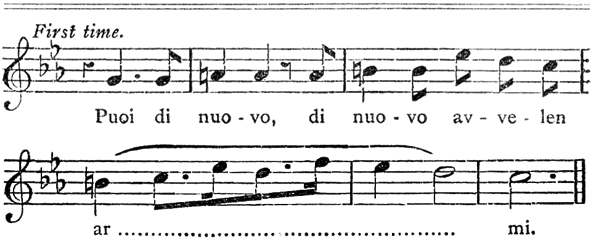
Puoi di nuo - vo, di nuo - vo av - ve-len
ar ................... mi.
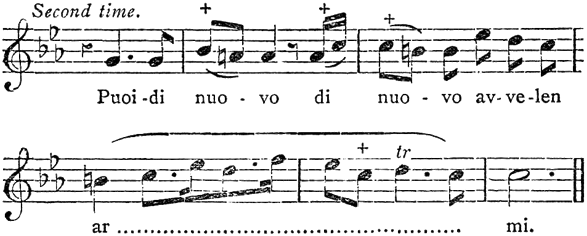
Puoi - di nuo - vo di nuo - vo av-ve-len
ar ................... mi.
The above are taken from a fine song by Cesti (1660), "Tu mancavi a tormentarmi."
The following are the adornments taught in the Paris Conservatoire, as traditionally correct in the famous old song by Lotti, "Pur dicesti," where, it will be observed, one simple phrase, which occurs so frequently that it would be monotonous if unadorned, is made to yield a charming variety to the song by some elegant change at each recurrence.

quel so - a - ve ... car - o ...... si

quel ... so - a - ve car ... o - si

quel ... so - a - ve car - o - si

quel.... so - a - - ve car - - o si
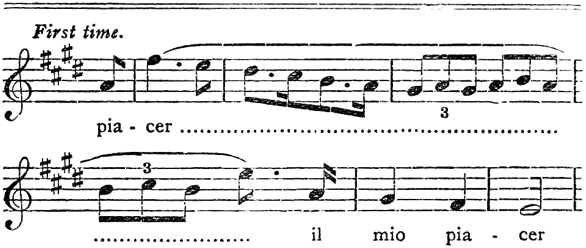
pia - cer .....................
............ il mio pia - cer
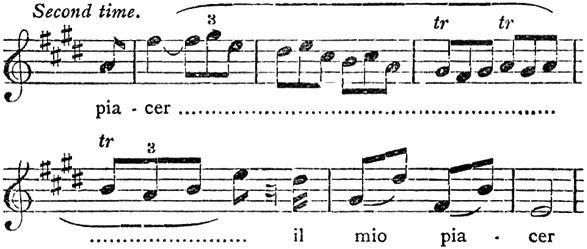
pia - cer .....................
............ il mio pia - cer
The following are from Handel:

While re - sign'd to Heav'n... a - bove

While re - sign'd to.... Heav'n........... a - bove
(Guardian Angels.)

Trees where you sit, &c.

Trees where you sit, &c.
(Where'er you walk.)
And of course the list might be almost indefinitely prolonged. Certain of these ornaments, once highly popular, have wisely been allowed to drop, and that is why I lay stress upon the importance of accepted traditions. You may get hold of copies of many songs of this kind which have the names of great singers attached to them, and yet give variations of the text which have never been accepted or generally approved. The great Braham himself was a terrible offender sometimes in this respect. For instance, in singing "Comfort ye," instead of the passage

that her in - i - qui - ty is par - don - ed
he would sing thus:

that her in - i - qui - ty is par - don - ed.
And I have seen an old copy of "Holy, holy," in which the melody is so overlaid with little black notes, semi-quavers, demi-semi-quavers, and semi-demi-semi-quavers, that it is difficult to distinguish the notes of Handel's music at all! The admissible changes are all very slight, and any elaborate cadenza, or considerable addition, is pretty sure to be wrong. Final high notes are a frequent[Pg 79] snare to aspiring singers; the traditions of the old school of oratorio singing are not in favour of them, and they generally vulgarize a song if introduced where the composer has not clearly opened a way for them. I have heard a tenor singer conclude the famous "Thou shalt break them," thus:

pot - - - - - - - - - - - ter's ves - sel
and a soprano finish off "He shall feed His flock," thus:

ye shall find rest ............... un - to your souls.
—both of them pieces of vulgar display, bringing the personality of the singer before the audience instead of the beauty of the music, the sense of the words, or the merit of the composer. No such abominations are permissible in good oratorio singing, the rule of which is utter submission to the composer's intentions, and a conscientious endeavour to interpret his mind clearly to the audience; a pure and chaste delivery of words and music alike; a sustained excellence throughout, avoiding an attempt to astonish by bursts of power or brilliancy; and an entire absence of all claptrap or vulgarities to please "the gallery."
Opera.—A great deal of what has been said about oratorio singing applies also to operatic singing. But I strongly advise you against attempting opera music until you have studied the more severe and solid style of the oratorio. The declamatory passages in opera are doubtless more brilliantly impassioned, just as the florid airs are more startlingly elaborate, than in oratorio, and the recitatives less stately and sustained; but the style of good opera singing is only to be founded upon good oratorio[Pg 80] study (or its equivalent), inasmuch as it was out of the oratorio that the opera grew. Operatic singing allows more license to the singer than does oratorio; but the singer should have been taught first by the severer style not to misuse that license. At the same time when (as is not infrequent in operas of a certain kind) the composer has introduced airs for the express purpose of showing off a singer's voice, a well-trained singer may be accepted as interpreting the composer's intention rightly, when he or she elaborates fioriture far beyond the limits of which any hint appears in the score.
Even here, however, traditional usage must have its weight: cadenzas must be strictly in character, and only introduced in songs to which such passages are appropriate. I once heard a florid cadenza interpolated at the close of "Spirto Gentil," by an aspiring young tenor, too full of conceit and "modern" ideas to take a hint from Mario's marvellous rendering of that song.
And it must be borne in mind that it is only in operas of the Bellini, Donizetti, and early Rossini and Verdi school that such extreme license is granted. No such tricks can be played with the operas of Mozart, Glück, Weber, or Meyerbeer, or with the later works of Rossini and Verdi, while the notion of altering a note, or omitting even a demi-semi-quaver rest, in those of Wagner, would be, to his admirers, flat heresy. In reality, the style of singing opera music is easily acquired by any one who is sufficiently advanced to be fit to attempt opera music at all. There are certain niceties to be acquired, and endless beauties of variety in the rendering of even small passages; but these things cannot be taught on paper.
Ballads.—There is no greater mistake than to suppose that "any one can sing a simple ballad." Good ballad singing is one of the rarest accomplishments, and demands qualities in the singer which may be wanting even in a person who can sing well both in opera and oratorio. To suppose that an untaught singer can do justice to any ballad that is worth the trouble of singing at all, is simply a mark of ignorance on the whole subject of singing.
Ballads do not always require power or compass of voice, it is true, nor do they tax the singer on the score of flexibility or physical strength; but they are the severest test of enunciation, mezzo-voce singing, neatness and readiness in producing tones of any gradation, and perfect control over the voice.
To sing a ballad well demands a really cultivated taste, a certain dramatic power, suppressed it is true, but influencing the whole delivery; a sympathetic voice, and a manner which will enlist the interest and sympathy of the audience. Ballad singing is neither declamation nor recitative: there is no chance of surprising or astonishing your audience; but you must contrive to please them, you must touch them somehow; and, for an ordinary person in the costume of the nineteenth century, to "touch" others of the same species is not easy. Sometimes, no doubt, the words of a good song are in themselves so touching and charming that, so long as the music be not positively hideous or destructive of the sense of the words, the singer has only to let them be clearly heard, and the battle is won; but more frequently he has to trick his audience into interest in a song where the words in themselves are either hopelessly silly, or too obscure in sense for their full meaning to appear at a first hearing or reading. All that he can then do is to deliver it in such a way that they shall feel that there is a meaning to it all, though they have not fully caught it yet, and so they may wish to hear it again. I do not, of course, mean any allusion to the ridiculous fashion of encores, but simply that the feeling at the end of such a song should be one of liking it sufficiently to wish to understand it entirely.
Many songs would tell their own tale and produce their own effect well enough, if the singer would let them, and therefore the ballad singer must only be sufficiently self-conscious to keep himself out of the way. However good his singing, however original his reading of the song, while he is singing it should all go to the credit of the song, and the hearers be charmed into forgetting him till he is silent.
Recitative.—Good recitative singing is of great importance,[Pg 82] and requires careful attention and study. Recitative is midway between speaking and singing; it is a sort of modulated intoning, that is, that in delivering it the note and the word that belongs to it should be given with equal intention, and appear to belong to each other so completely that the musical sound should seem to be the natural intonation which the reciter would give to the word. Recitative is (or was) practically an attempt to express, in musical notation, the inflexions of the human voice in speaking; and how accurately, in some cases, musical notation can do this, will be seen at a glance by the following illustration:

Who are you?

Who are you?

Who are you?
—where the question is asked in the same words, but the musical notes express clearly three different sentiments, or degrees of sentiment. This should be taken into consideration by the student; and he should strive to give his recitative with as natural a delivery as he can, placing himself mentally in the position of a dramatic reciter.
Steadiness of tone, clearness of enunciating consonants, and full round delivery of vowel-sounds are indispensable to good recitative singing. Every note must be distinct, and not the faintest suspicion of a "slur" or portamento can be allowed.
Recitative singing is not a thing which a student should try to teach himself, as he may not only waste his time,[Pg 83] but gain notions which are erroneous and difficult to cure. For instance, take the recitatives in "The Messiah," as these are printed for the British public. Nothing could be more ludicrous than for a singer to appear in public and sing the recitatives faithfully as printed in the editions of this oratorio which are continually being disseminated throughout the land. Handel, let it be borne in mind, was not well acquainted with the English language; and though he may have written good music, he was often very far from reaching good literary sense. Thus, as regards this latter, this specimen passage occurs in Handel's "Acis and Galatea,"

Where shall I seek the charm-ing fair?
Yet no one in his senses would think of rendering it other than

Where shall I seek the charm-ing fair?
inasmuch as there is some doubt of the chord 6/4 which forms the grace note being Handel's music, and because the sense of the words demands that no break shall be made between the words seek and the. As Handel failed in his English, it is surely allowable to make good his deficiencies in this respect.
The following paragraphs relate to certain minor details of style in singing, and apply to singing of every kind. They must be taken in conjunction with much that has already been said under the head of "Practice."
Slurring.—Slurring up to a note is a very disagreeable and common evil to be guarded against. It matters not how far distant the note to be sung may be from the preceding tone; it should be attacked fearlessly and cheerfully, but with an open throat. The note to be attacked[Pg 84] must not be prepared in the throat. The course should be this. The tone of the preceding note must not be moved, but the one required—say a very high one—must be obtained by the joint process of lowering the larynx, of sounding the note from exactly the same spot as the lower note, in a soft but fine tone, and thirdly, by getting such a ring in the note as it can only have in conjunction with the feeling that while the root or foundation of the note is in the chest, yet it owes much of its penetrating character and power to a sort of reflecting power which is given it from the extreme end of the spine bone, where it joins the head. Certainly no high note is properly produced, nor to be relied upon for a crescendo, unless the student has this feeling that it springs from the back of the neck; and, in rising to an upper note, the aim should be not at length to approach the upper note from beneath, as it were, but to "come down" upon it—to strike it from above instead of from below.
Sentiment.—Always try to convey the sentiment of what you may be singing through the tone of the voice. Love and anger cannot both be expressed with the same quality of voice. For the former, a delicate light tone well on the lips is desirable, while for the latter the voice should be produced lower in the stomach; yet the tone should still be kept on the lips; its character should be "darker," more round, and sonorous. "'Tis this that racks my brain"" such words as these should never be sung in the same character of voice as "Waft her, angels, to the skies." It is good practice to take any piece and sing the melody on an open vowel throughout, with the object of showing the meaning of the song without the aid of words. Then, when this can be done, the words may be employed, and the result will be doubly happy.
Decision.—Indecision is a very serious fault in singing. Do well and thoroughly whatever you decide upon attempting. If you have a staccato passage to sing, render it firmly in that style; if you have one that is legato, take care that this character is strongly seen from your rendering.[Pg 85] When you "slur," make it strong enough to be felt. If you bend as it were from one note to another, let your intention to do so be clearly apparent. Let a forte passage be loud, and let a piano one be really soft. Any half measures in singing are fatal. Precision and certainty are qualities which the student must always aim at attaining. Without them, singing becomes tame and unattractive, not to say tiresome.
Imitation.—Imitation, which in many other arts becomes plagiary, in singing is most desirable; for singing, more than any other art, rests on tradition; there is even very little doubt that the peculiar charm and quality of a true tenor voice (for instance) is more due to imitation in a singer than to nature; that is to say, that it is the result of a transmitted culture—such imitation being the only means in which singers can reap the harvest of the experience of the great singers now to be heard no more, who have left their imitators to pass on to others what they themselves obtained by imitating and improving on their predecessors. Therefore do not be afraid of being set down as a mere copyist, if you study and attempt to imitate the style of the best living singers. You will always have enough of your own merit or defect to distinguish your performance, if you are really a conscientious student, and you may learn a great deal by listening to the best public singers which can be taught you in no other way. Watch their stage deportment; their treatment of the weaker parts of their voices; their method of breathing; their manner towards the public;—in fact, every point which occurs to you,—and make some use of what you see and hear in your own studies.
Public Singing.—If you have to sing in public, remember always to take a rapid but searching glance round your stage. This is a great point gained. As you step on to "the boards," notice (unobserved) the dimensions of the stage (if it happens to be new to you). Note the height of its ceiling, its surroundings, its draperies, its distance from your farthest auditor; then take up your position[Pg 86] accordingly—bearing in mind that all your tone is wanted by your listeners, which requirement can never be met unless you yourself take the precaution to prevent the sound being held or carried back by the stage decorations. In a concert salon or theatre, then, do not forget to get well to the front of the platform. At the same time you must not be too close upon your stall occupants, or you may give them the very undesirable impression that at any moment you may fall over.
"Holding" an Audience.—The singer should carefully watch an audience so as to gauge its attention and sympathies. If it seems impatient, restless, and indifferent, the singer may be quite sure that he or she is exciting no interest. The best course then for one to do is to immediately change the style, alter the tone, give forth his or her best energies, and use every effort to become ingratiated into the good favour of the listeners. If such effects as these fail constantly in their turn, then the aspirant for vocal fame should give up, and devote both time and attention to further study, or to some other means of a livelihood; for a future great singer will not be failing constantly, and to be only a second-rate singer while there are so many is a thing not to be devoutly desired.
Mistakes in Public.—If you make a mistake in singing, do not add to the mischief by allowing it to alarm or disconcert you. Proceed onward as if nothing had happened. You may be quite sure that each one of your audience will not have detected the slip, for they cannot all be critics. But bear in mind that such confidence as your adviser here suggests is not to be too often called into requisition. No great artist will ever make a serious mistake in public. How much more careful then should the young student be!
I need perhaps scarcely remind my readers who are or
who wish to be singers that time concerns them quite as
much as the conductor, the pianist, the violinist—in short,
the whole orchestra. It behoves the student in singing
to give early and careful attention to this important feature
in his artistic training. You may have the voice of a
Rubini, you may be a second Tamburini in quality and
extent of voice, but unless you can sing in time yourself,
and are able to do so with others, and with the counter-acting
influences of an orchestra, you can never hope to
rise in your profession. It may be argued that you have
no desire to lay yourself out for a career on the lyric stage.
Then, however, you shut yourself out from some of the
largest prizes in the profession; beyond which there comes
the question of oratorio business, and the growing taste
for band accompaniments to songs. And if you restrict
your ambition to a pianoforte accompaniment, time is
needed even with that in order to produce anything like a
satisfactory rendering of the piece you may be singing. The
accompanyist may be a Sir Julius Benedict, or a Signor
Randegger (than whom there is no better in this country,
so neglected has this species of musical art-work become);
but a perfect rendering depends not so much upon the
pianist as the vocalist. If the singer flounders about with
neither "rhyme nor reason," it is scarcely reasonable to
expect the accompanyist, clever as he may be, to be always
at his heels, like a cat after a mouse. I would therefore
advise the student to invest his money in a Metronome—the
most useful thing with which he could provide himself.
They are not dear, bearing in mind their utility,
and one will, I am sure, save the student much time and
many a fiasco. Learn the working of this useful machine,[Pg 88]
and practise all your exercises with it. If you go to a
good singing master, you should ask him to time your
exercises to the pace at which you should sing them, and
in this way you will not only be growing in a good habit,
but your singing will be characterized by a crispness and
a certainty of attack, which will be apparent to all musicians
and amateurs with good taste. Your singing
master will, no doubt, impress upon you the necessity of
singing your songs in time, and especially of slightly accenting
the first and third beats in the bar if it is common
time, the first and fourth beats when it is compound common
or 6/8 time, and the first beat when it is triple or 3/4 time.
In this way there will be meaning given to your singing,
and those who may be accompanying you will be able to
feel where you are, and to keep time with you. In singing
a passage like this from Cowen's charming song "Aubade,"—the
[Pg 89]master, if he knew his business, would instruct his
pupil to slightly accent the words as I have indicated with
the mark ![]() , and to preserve strict time throughout the passage,
and especially in the taking up of the words after the
long note on the word sleep. The accompanyist would, we
may assume, do likewise with his pianoforte part, and in
this way a perfect ensemble would be secured.
, and to preserve strict time throughout the passage,
and especially in the taking up of the words after the
long note on the word sleep. The accompanyist would, we
may assume, do likewise with his pianoforte part, and in
this way a perfect ensemble would be secured.
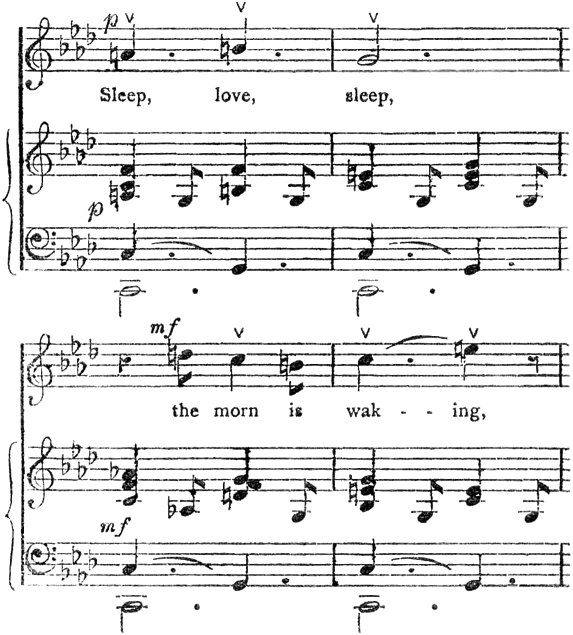
Sleep, love, sleep,
the morn is wak - - ing,
With this brief introduction to the subject, I will proceed to give the student a few exercises in keeping and beating time, the assiduous practice of which will, I hope, soon place him in the desirable position of being able to sing in time.
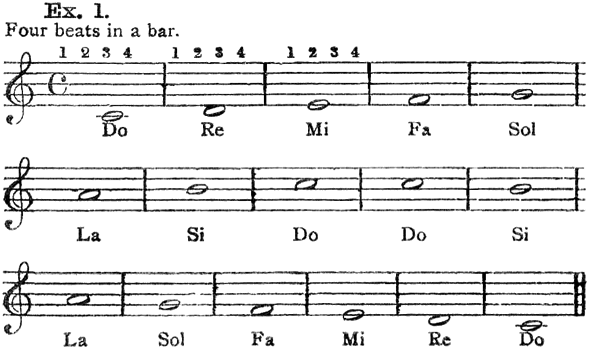
Do Re Mi Fa Sol
La Si Do Do Si
La Sol Fa Mi Re Do
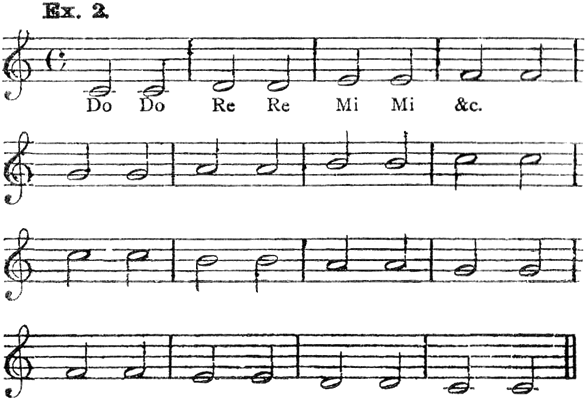
Do Do Re Re Mi Mi &c.
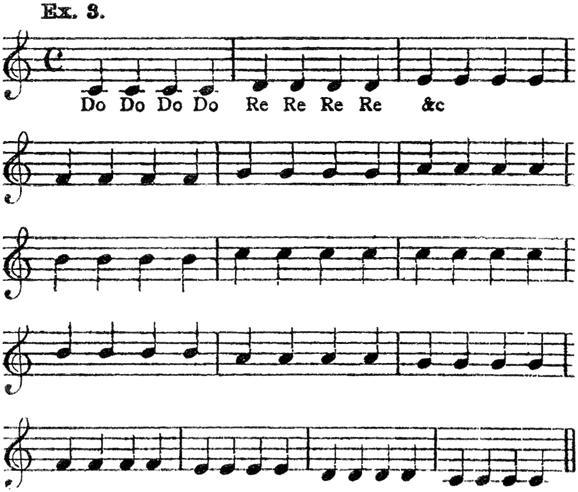
Do Do Do Do Re Re Re Re &c.
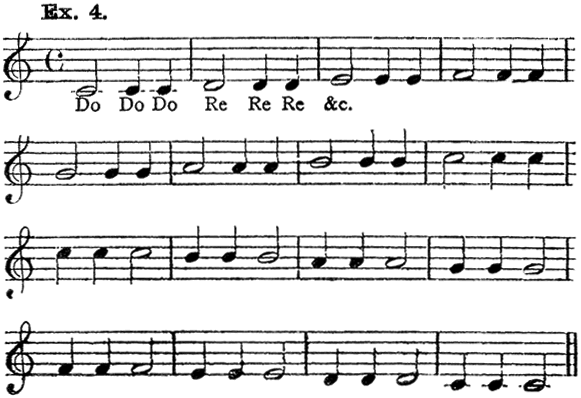
Do Do Do Re Re Re &c.
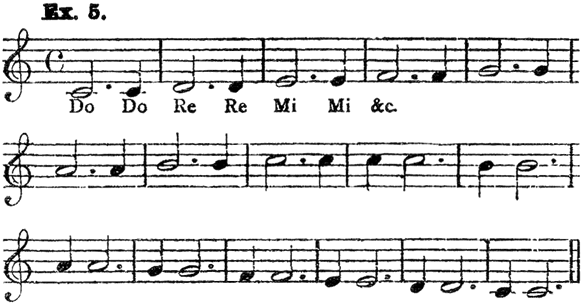
Do Do Re Re Mi Mi &c.
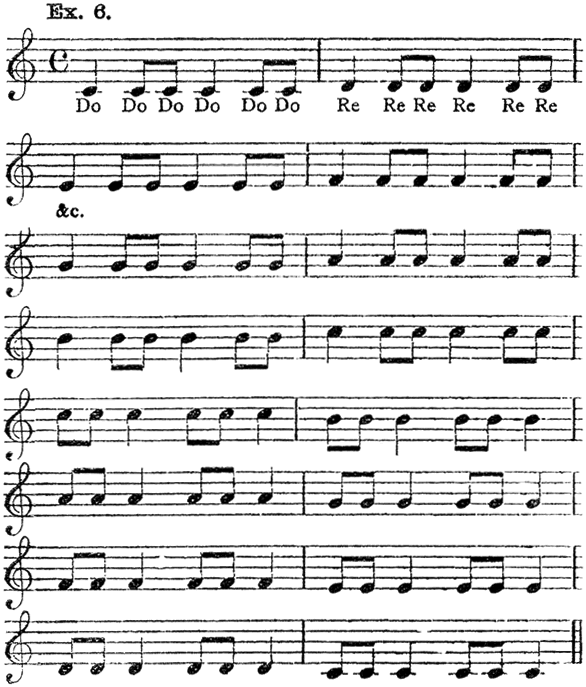
Do Do Do Do Do Do Re Re Re Re Re Re &c.
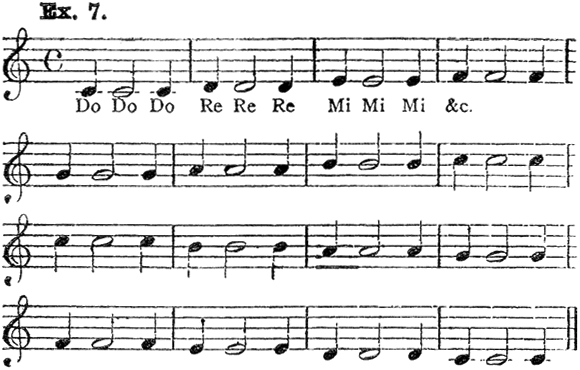
Do Do Do Re Re Re Mi Mi Mi &c.
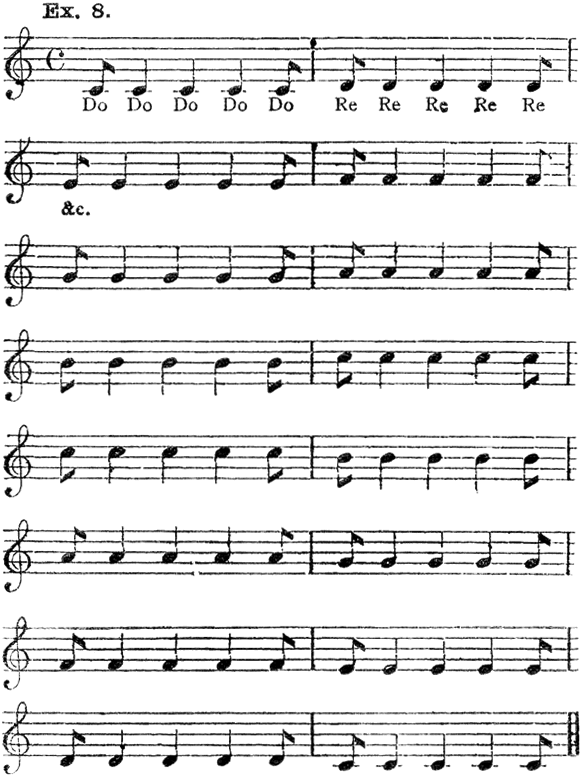
Do Do Do Do Do Re Re Re Re Re &c.
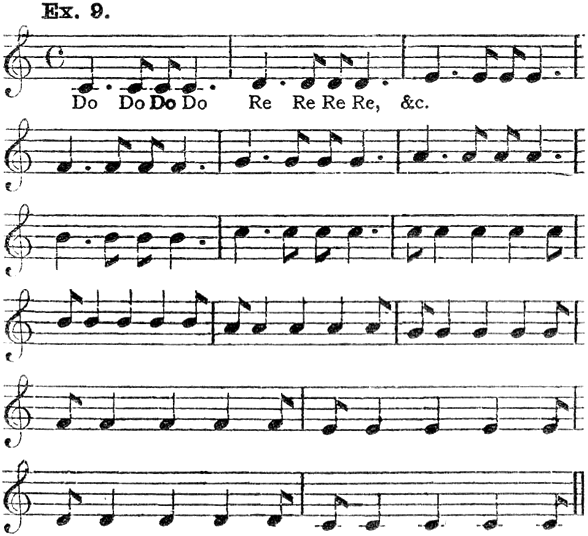
Do Do Do Do Re Re Re Re &c.
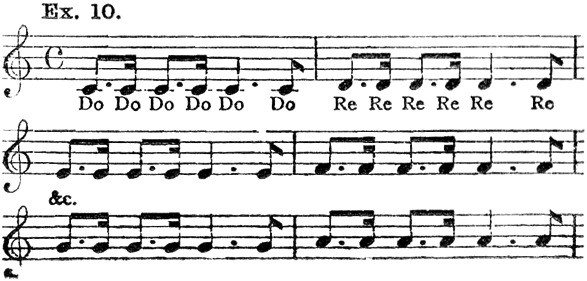
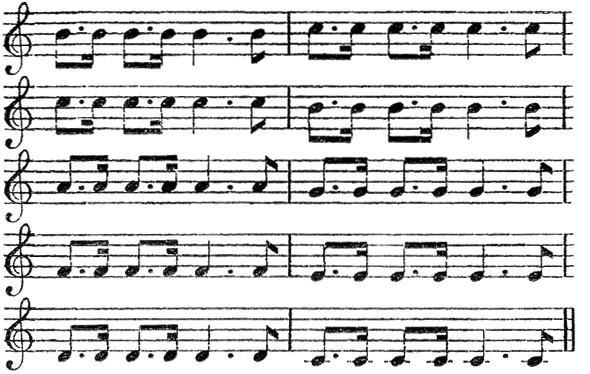
Do Do Do Do Do Do Re Re Re Re Re Re &c.
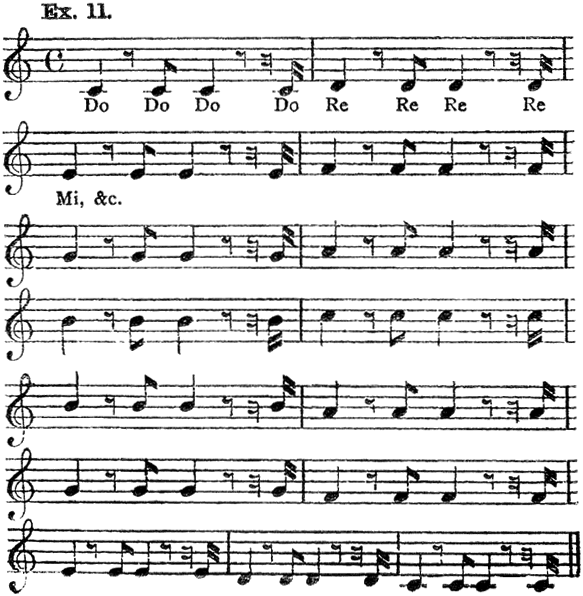
Do Do Do Do Re Re Re Re Mi &c.
These exercises may be timed as slow as you like on your metronome—the slower the better—but 76 is a good pace to begin with; when you have thoroughly mastered them at 76, take them a little quicker until you can sing them accurately up to a good brisk time.
No 1 has but one note in the bar, and this must be held on steadily for four beats of the metronome—care being taken to leave each note in sufficient time to take a fresh breath, and attack the second note and syllable in precise time with the metronome beat. I need, perhaps, scarcely point out that much good will be obtained if the student can accustom himself to feeling in his mind the rhythm and beating, so as not to acquire the habit of trusting to mechanical appliances, which are dispensed with at public performances. The sol-fa-ing must be strictly adhered to, and in Exercises 2, 3, etc., it will be seen that the syllable must be sounded twice and four times respectively. With Exercise 5 the dotted note comes in; but I will not stay to explain that, as I assume that my readers will have acquainted themselves with the elements of musical theory before taking up singing. Especial care should be given to Exercise 7, as that is the first step in the difficult matter of syncopation, carried out elaborately in Exercises 8 and 9. With Exercise 11 the question of Rests comes in, but the same remark that I made as to the dotted notes applies here. Everything that it is necessary to know about them should be found in any elementary musical grammar.
Having mastered the above exercises, the reader may take the following with two beats in the bar—taking the precaution to set them at a slow time on the metronome, say 76, not singing them quickly until he is thoroughly acquainted with them.
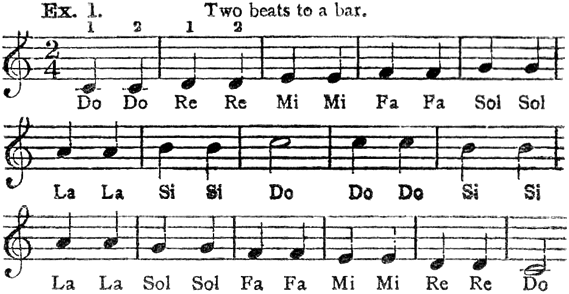
Do Do Re Re Mi Mi Fa Fa Sol Sol
La La Si Si Do Do Do Si Si
La La Sol Sol Fa Fa Mi Mi Re Re Do
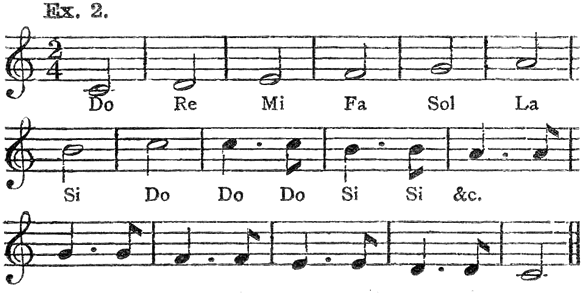
Do Re Mi Fa Sol La
Si Do Do Do Si Si &c.
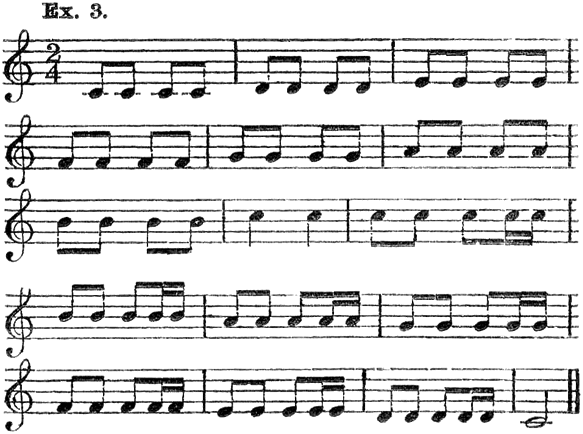
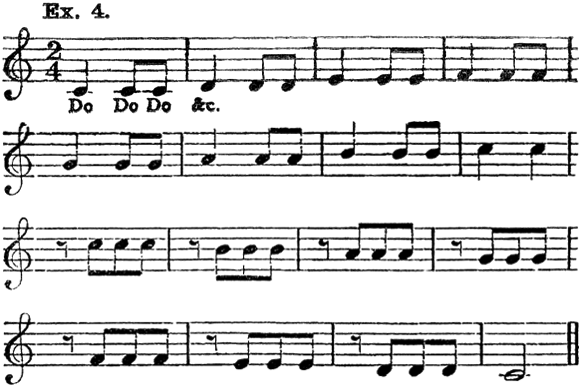
Do Do Do &c.
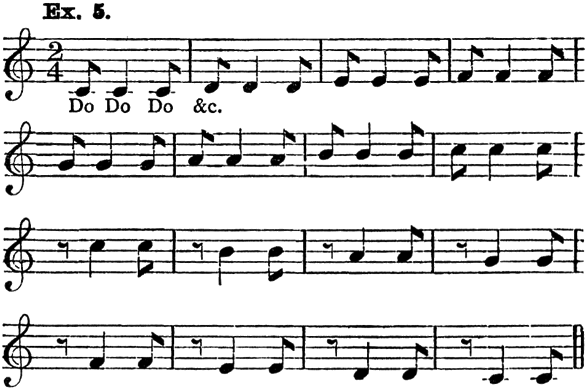
Do Do Do &c.
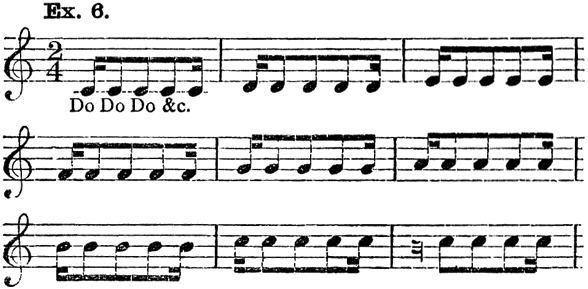

Do Do Do &c.
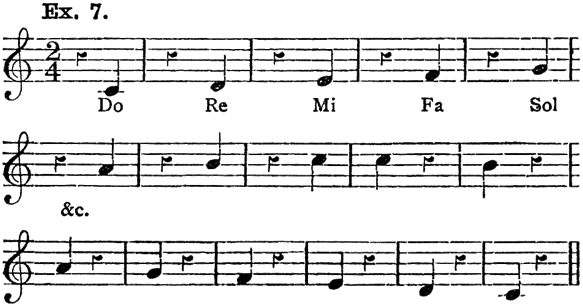
Do Re Mi Fa Sol &c.
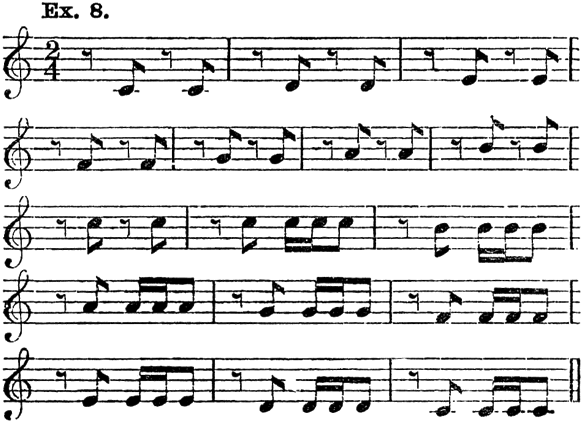
After which he may take the following with three beats in the bar:—
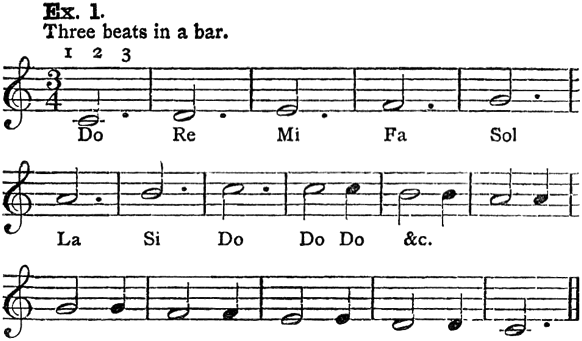
Do Re Mi Fa Sol
La Si Do Do Do &c.
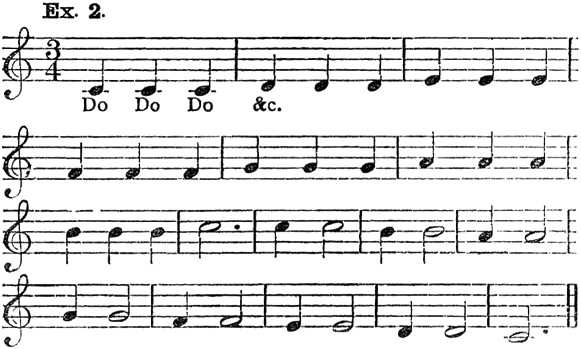
Do Do Do &c.
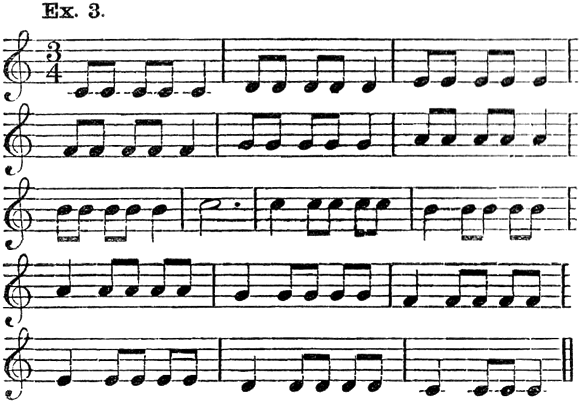
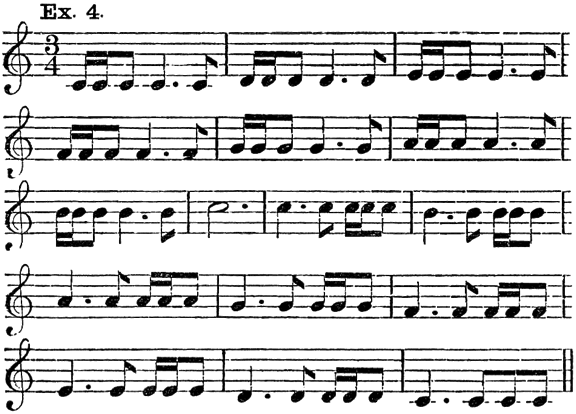
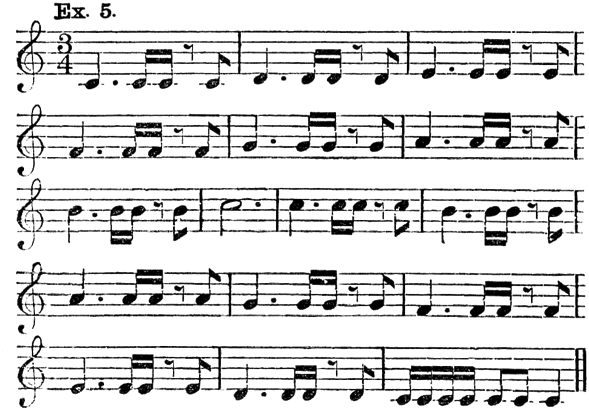
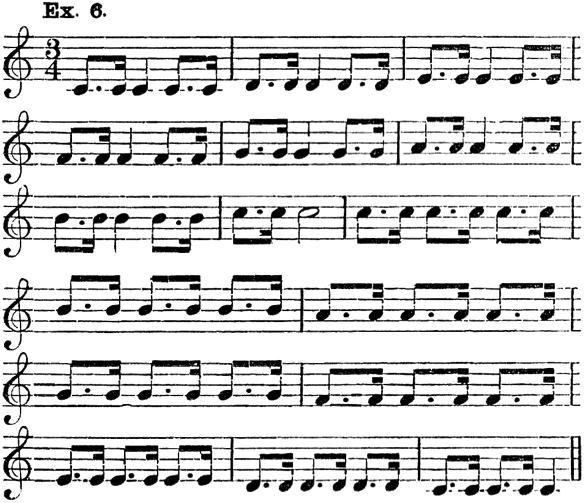
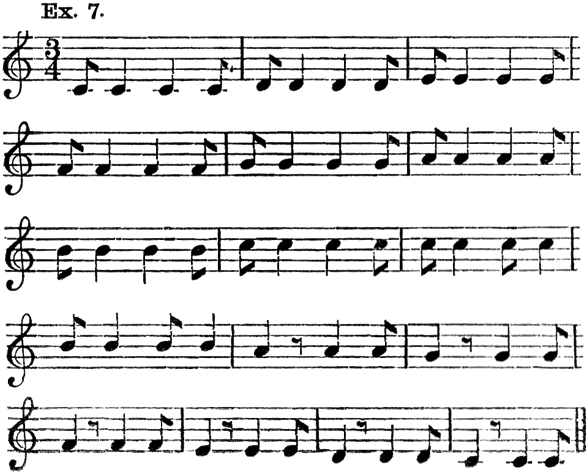
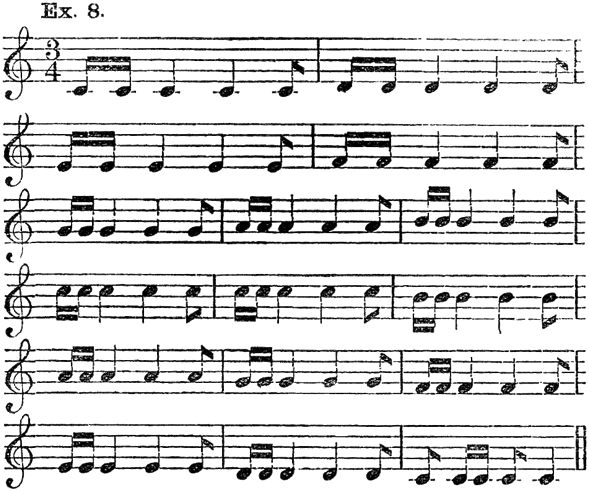
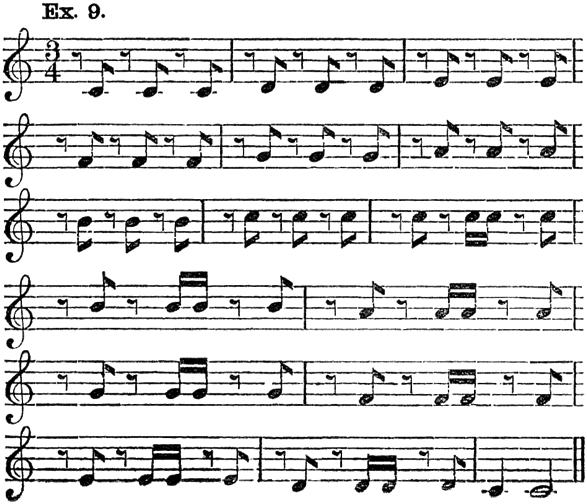
There are, of course, no rules to be given to guide the student in the choice of music, except the general ones, to choose good music, pleasing music, and music suited to his voice and powers. But those general rules touch incidentally on a few points on which it may be well to offer a few remarks.
Music must suit the Voice.—Your music must not only be appropriate for your voice in compass, but it must be such as has been written for a voice of your kind. This is a most important thing to remember. Nothing is more provoking to a person of good taste and musical knowledge than to hear songs composed for a voice of one class sung by a voice of a totally different character; and yet this is a vice which even good artists will sometimes weakly succumb to. The popular song of Gounod's, "Quand tu chantes berçée," for instance, has been sung to death by many soprani and contralti, in various keys. One would have thought that the words alone would have shown them the utter absurdity of what they were doing; but no, for the sake of producing an effect (upon an audience who naturally supposed that public singers of high standing knew what they were doing, and why they did it), these good ladies committed what I do not scruple to call a vulgar and inartistic blunder. The song is a man's song, and no woman should attempt it.
This fault is one which amateurs are very apt to fall into, and a long list might be made of songs which have suffered[Pg 104] this unfair treatment. Soprani sing tenor songs—(I have often, in the early days of the popularity of "Il Trovatore," heard a soprano sing "Ah, che la Morte!"—tenors, those written for soprano—(e.g., I know an amateur tenor whose "crack" song is Iphis' "Farewell" in "Jephtha"). Contralti and mezzo-soprani steal bass and barytone songs, as "But who may abide," from the "Messiah," and basses and barytones return the compliment by appropriating "What tho' I trace," or "O rest in the Lord.")
There is a reason, quite apart from the question of taste, which renders this practice objectionable. A composer of any skill writes his accompaniment as well as his melody with reference to the voice which he wishes to sing it. Now, if that voice be—we will say—a soprano, the accompaniment will be written for a voice of that pitch, as well as of that character and compass; the progressions of harmony will be written with due regard to the actual place of the vocal notes in the scale. But directly the song is sung by a tenor—a voice which pitches every note an octave lower than the soprano—the relation of the vocal notes to the accompaniment is changed; notes that were intended to be fourths above the accompaniment will become fifths below, and progressions which were correct in the composer's intention become wrong in the effect produced by the singer. That is an extreme case, I grant, but it is only a fair instance of the sort of result which follows on such changes, and it is sufficient to show that the rule rests on reason and not caprice.
"Original Keys."—Do not bind yourself, as some think it necessary to do, always to sing your songs in the original keys. Remember that opera and oratorio music, and a large number of modern "ballads," were composed for performance in large buildings, theatres, and concert-rooms. The keys, therefore, were chosen with due reference to that fact, and to the (in many cases) exceptional voices of the singers. The raising of the pitch in later years also affects the question.
Now, if you have to sing in a drawing-room, the pitch, volume of tone, and style of delivery must be appropriate[Pg 105] to chamber music, and not to the stage of Covent Garden, and the keys which are necessary for due brilliancy and effect in a concert-room are frequently unsuited to a drawing-room, giving an appearance of strain and noisiness to the singing. A good deal of opera music is as unfit for singing in a drawing-room as would be a grand symphony for performance there; and an artistic singer should bear in mind this principle of fitness in his selection.
At the same time, if it is considered desirable to transpose a song, let it be only for that reason, and let the aim be to produce the same effect, relatively, in the drawing-room, as the song in its original key is intended to produce in the concert-room. Do not transpose recklessly, merely to "suit your voice:" if you are a barytone, for instance, do not sing tenor songs a few notes lower; or, if you are a soprano, do not transpose contralto songs to suit your register. For the character of the music (if the music is good) suits the voice for which it was intended, and there is a risk of destroying that character by giving it to a voice of another kind. This has been proved over and over again on the stage in several notable instances.
Execution.—Do not be too ambitious in selecting florid songs for performance either in public or private. "Fireworks" in a drawing-room rarely please, while in a concert-room they must be very perfect and first-rate in execution to do so. Of course, if you are a professional artist you must include such work in your studies, and even for the amateur the practice of florid music, under a master, is most desirable as an exercise. But where the choice of a song for a concert rests with yourself, sacrifice ambition to prudence, unless your voice is naturally a very flexible one, and your training in that style of music very complete. I give, on this subject, a quotation from an old and experienced writer on music and singing:
"Execution is certainly one of the most difficult parts of musical science. Young singers are desirous of attaining it without reflecting whether, from the formation of the throat and various physical causes, they may ever be able to accomplish their wishes. Few, indeed, possess the[Pg 106] power of execution in a pre-eminent degree. It is in part a gift of nature: those who have ever delighted as well as astonished us by their rapid manner of running through divisions must have been naturally endowed with flexible organs.
"... Some voices may be compared to gems which in their original state are dull, and, to those unacquainted with their worth, of no value.... It frequently happens that singers, from timidity or want of proper knowledge in exercising their voices, remain ignorant of their own qualifications. The hinges of a door which have continued for years undisturbed, will, when the door is re-opened, grate harshly on the ear; but every effort renders the harshness more tolerable, until, from frequent use, they move easily. Thus it is with the voice: on the flexibility of the uvula and the muscles connected with it depend both the perfectibility of the shake and execution. But still it must be acknowledged that acquired execution should never be exercised by the side of nature otherwise than sparingly, even where necessity requires it, for the latter possesses an easy velocity which can playfully sport with its subject at will; but, however gratifying the power of execution may be considered by those who possess it, I recommend them not to be indiscriminately lavish, lest they cloy by too great a profusion, and, as Voltaire remarks, 'shine in trills and divisions, at the expense of poetry and good sense.'"
Fashion.—The songs which are "the rage" at any time are always great snares for amateurs. Aspiring young singers hear a ballad charmingly rendered by some great singer, and straightway go home, send for it, and on the first available opportunity treat their friends to their version of it. This is really unfair to themselves, as it throws them into unwise contrast with the public singer who has made the song popular, and whose well-known rendering of it forbids ordinary hearers to judge the rendering of an amateur on its own merits, or by any rule but that of comparison. Moreover, "popular" songs—I mean songs whose popularity is largely due to their[Pg 107] having been sung by favourite public singers—are by no means always good in themselves; or, if fairly good, by no means easy; or if good and not difficult, by no means always sufficiently so to make it worth while for an amateur to spend time and study on them. In very many cases the public singer has to sing these songs because he is paid for doing so, and gets a "royalty" on every copy sold; it is simply one development of the hydra-headed art of advertising, and such productions are known by the vulgar name of "pot-boilers," i.e., compositions hastily thrown off to bring in a little money "to keep the pot boiling." If composers who are capable of better things are reduced to making money in this way, we may be sincerely sorry for them; but speaking from an artistic point of view, the practice is reprehensible, and "pot-boilers" are not the kind of music which a young singer, anxious to improve, should waste time or money upon. I am far from saying that there are no good songs to be found among new music, but I think they seldom lie on the top of the pile.
Forming a Repertoire.—In gradually forming your repertoire, or collection of properly studied songs for drawing-room or concert singing, do not be in haste to make it a large one. It is better to know only a few songs and do them really well, than to sing a large number indifferently. If you are studying for the profession, there is a considerable number of songs which you will be expected to know as a matter of course, but over and above such, every singer should have a special repertoire of his or her own, and it is of this that I now speak. Your selection of songs, like your singing, should have the stamp of your own individuality upon it. You should have a little stock of songs, with which your singing is in a way identified, and which you must be able to sing in a manner that at once stamps those songs as your property, so that another person might say, "I could not sing that song before you, it is one of your own."
To form such a repertoire, you may have to go a little out of the beaten track of what is best known at the time.[Pg 108] If opera music suits you best, look at the operas, never performed now, of Glück, or the less known of Mozart's, or earlier works of Rossini, Auber, &c.; or else try and get hold of works not yet known in England, such as Macfarren's, Wallace's, Purcell's, and a few other such native dramatic composers. In a word, do not limit your notions of operatic music to what you hear year after year at Covent Garden or Her Majesty's.
So, too, in oratorio: search in the less familiar oratorios of Handel, and such of his operas as you can get access to, and carry the same idea out in examining the works of other composers, ancient and modern. Good work has been done of late years by various publishers in publishing many works of this class, and there are plenty of these which are still unfamiliar and unhackneyed.
The same with your songs and ballads: before you rush into the modern fashionable ballad, see if you cannot find a few that you can appropriate among the stores of old English music, or the detached songs of old Italian masters (many of which are magnificent as songs, and utterly unknown at present, except to the few).
It is highly expedient that singers themselves, and intending students of the art, should make some acquaintance with the physiological surroundings which are brought into play in the process of voice production. A knowledge of the technical terms for the various organs directly involved is very essential, and the intelligent student will see the necessity not only for distinguishing such names as "larynx" and "diaphragm," but also of possessing some idea of their whereabouts in the human frame. No better course could be adopted for the acquirement of such a knowledge than attendance at the classes and lectures at the musical colleges and other institutions, which, from time to time, secure the assistance of qualified specialists to speak upon this very important branch of the singing art. No other mode of teaching is so well calculated to enlighten the uninitiated in the wondrous mechanism of the human voice, and to inspire him or her with an adequate sense of the watchful care and delicate treatment which a voice worthy of systematic training demands, as well as deserves, at the hands of students of both sexes. As a preliminary to a fuller inquiry into the subject, the following few notes may be fixed upon the mind:—
The Larynx (λάρυγξ) constitutes the upper part of the wind-pipe. It is the seat of the voice, and essential parts of it are the "vocal cords" (chordæ vocales), two membranes in a horizontal position across the larynx. It is[Pg 110] popularly called "Adam's apple" (pomum Adami), the protuberance so often recognizable in the throats of bass singers, but a more correct use of "pomum Adami" is when it is applied to a projection in the thyroid cartilage—a part of the laryngeal structure.
The Thyroid (from Θυρεός) is a shield-shaped cartilage, and that part of the larynx which, in the case of both sexes, develops suddenly at the period when they pass from youth to mature age. Other important cartilages are the cricoid (from κρίκος), a ring-shaped membrane; the arytenoids (from ἁρύταινα a pitcher); the epiglottis (ἐπί-γλωττα), situated at the back of the mouth; and the cartilages of Santorini, or cornicula laryngis.
The trachea, or wind-pipe, is capable of rising or falling, and thus is produced the perceptible movement of the larynx in the throat when speaking or singing. It is by lowering the larynx, and so commanding an expansion of the throat that the best tone is possible in the voice, and it is this open throat production which some teachers are aiming at when they charge their pupils to "sing from the chest." A more sensible request would be to "lower the larynx," since such a lowering of this organ places the throat in the most favourable position for emitting sound; as well as for enabling the lungs, or wind-chests, to act most advantageously upon the true vocal cords. Moreover, this lowered larynx production leads to the best results from the vocal cords themselves. The natural tendency is to sing as we talk, a process which involves a demand upon the upper fringes of the vocal ligaments only, but no long-sustained singing could be maintained by this means, nor does it requisition any art-knowledge or principle. Directly, however, we begin to utilize the lower edge of the vocal cords, we are verging upon the art of producing the voice; i.e., creating a something which will not manifest itself without the first application of some art principles. Here lies the whole secret of singing, viz., the utilization of the lower portions of the membranous folds popularly called the "vocal cords," instead of working merely their topmost fringes, as do the innumerable tenors who sing "throaty," and as we all do[Pg 111] up to a certain point, in the ordinary process of speaking. The singing voice and the speaking voice are two totally different productions, the former never to be acquired except at the hands of a capable master, who, himself, has been properly taught the principles of voice production.
The lungs, or bellows, or air-chambers lie, as is well known, on each side of the chest, resting upon the diaphragm, and performing a very important function in singing. They supply the air which acts upon the vocal cords, and in true singing are the first organs for consideration by a vocalist, since so much depends upon the way the wind, or breath, is brought to bear upon the vocal cords. For this reason the abdominal method of breathing—the filling of the lungs from their bases—becomes the best method for inspiring the breath in singing. Doubtless, in breathing, the lungs are replenished from above downwards, but it requires something of the sensation of these air-supplying substances being filled from their bases in order to requisition the full help of the diaphragm, a great muscle which separates the lungs from the abdomen, and which may be called the fundamental basis on which all voice production rests.
The Pharynx (φάρυγξ) is situated behind the mouth, between the tongue and the arch forming the circumference of the palate. Its province is to reflect the voice on its issue from the glottis. It is an elastic aperture, and may be well styled the reflecting organ of singing. It can take various forms, and bears a great part in giving character to the sounds originated in the larynx.
The Voice—a Wind, Reed, or String Instrument? Much discussion has spent itself in settling the question of "family" to which the vocal instrument properly belongs. The vocal chords are known to be composed of a yellow elastic fibrous tissue in their anterior parts, the posterior portions consisting of a tougher muscle or cartilage. Many maintain them to belong to the "string" family, since the sounds generated are produced as on a violin—the[Pg 112] higher notes by increased tension, the lower tones by a reduction of the strain. In this process, the muscle, popularly known as the epiglottis-cushion—a fat mucous membrane—presses on to the vocal cords, modifying their vibrating length. Thus, in an extreme high note, the cushion presses intensely upon the cords, considerably shortening their one inch length. In reverting to a low note, this tension becomes withdrawn, and the whole length of cord is at play to produce its lowest tones. An unfortunate objection to this theory—that the vocal cords can be styled a stringed instrument, is the fact that no string of the small extent of the vocal cords could be capable of sounding either so many, or such low notes; moreover, the mathematical treatment of their vibrations, as governed by the tension, is not correct, as they are in the case of a violin. It is a useful theory, and method of reasoning, however, for those teachers of singing who maintain that to get high notes, a light and thin style of singing, and the use of the upper fringe of the vocal cords (the production point), is preferable, in contradistinction to those who declare that no really good chest note with any telling power worth considering is possible, unless the vocalist sings deep in his chest and gains the idea, as he goes for his note, of requisitioning with all effort the lowest depth in the cord. Surely this point presents the greatest difficulty for singers with whom compass, especially at the top of the voice, is an imperative necessity, albeit that people go on talking to the contrary; and it is a matter which needs settling among voice specialists and singing masters. We are told, and it is generally known, that the tension of the epiglottis-cushion produces a higher note just as the shifting of the finger on the violin string affects its tone—a process which may produce falsetto sounds, but which surely is not the basis upon which great Italian singers of the Mongini and Tamberlik type secured the great chest Cs, which, with their resonance and brilliancy, were wont to make our opera houses ring again. Is it not a fact that in voices of this calibre, as well as in those trained on what is known as the broad lines of the true Italian production, the[Pg 113] whole surfaces of the vocal cords become more or less requisitioned, and that they vibrate the whole of their length and breadth, not merely the sides, rather than that any upper portion is mainly utilized while the lower parts are resting? The answer to this question would seem to indicate that the human voice is of the nature of a reed instrument. These membraneous organs, which we term vocal cords, are such that their whole surfaces must vibrate when brought into contact with a current of air from the lungs. The voice reed, in fact, vibrates freely backwards and forwards, and so corresponds with what are known as "free," not "beating" reeds—such as are found in concertinas, and the like.
That the voice is something of an organ pipe (a flue pipe) is an illusion only indulged in by writers and teachers prone to descriptive language, which they do not stay to inquire into, either for their own edification or for the enlightenment of other people. There is absolutely nothing to maintain such an idea.
It is important that the nature of the matériel of the vocal cords should become widely known, since such a knowledge, elementary as it might be, would, at the outset, enable students to get at once upon the right road to singing. To grasp the idea that the initial sound-producing means are these bits of semi-lunar membranes, acted upon by the breath from the lungs, and that they vibrate violently or orderly in proportion to the care with which the breath is brought to bear upon them, is to master the first great difficulty in singing. This once grasped, it is not hard to realize that the sound emitted is moulded and shaped, modified and beautified by other organs of the laryngeal machine and its surroundings, as well as by such variable conditions as the state of the human frame generally, and the particular condition of those organs of the body most directly concerned in supporting the work of the larynx may happen to be in. It will save the student much time if, before he (or she) begins to study singing, some first acquaintance be formed with the physiological surroundings of the human voice, and it is worse than useless to go to a master who teaches singing in blind[Pg 114] ignorance of, and doubtless contempt for, these physiological principles. The student who has familiarized himself with the structure of the vocal organs will have made a much more intelligent progress in his art than the one who has not, and will be competent none the less readily to understand the instruction of a qualified master than to detect the shameful pretence and humbug of the quack.
Board Teachers' Laryngitis—Clergyman's Sore Throat—Throat Exhaustion, etc.—Among the greatest evils of this competitive teaching age is the mischief arising from the constant and at the same time injurious use of the voice. All who use the voice constantly must learn how to breathe, and produce the voice. Failing that, serious mischief, which even the specialist of throat hospitals cannot cope with, must inevitably follow. The only advice that can be given here is, immediately that voice exhaustion sets in, to consult not a doctor, but a throat or voice specialist. The best institution in the world for throat troubles is the Throat Hospital, Golden Square, London, W.
This first exercise is a most useful one in the uniting of notes and in gaining facility. The student should at first practise it very slowly, mastering four bars at a time. Although I have divided it into fifteen examples, it is really but one exercise, with a minim rest between each phrase of four bars; and it is in this example form that I wish the student ultimately to sing it with the metronome, at say 76, taking breath only at the rest-mark, and making the crescendo—not, be it observed, by forcing the tone and breath, but by a gradual pressing down of the breath.[2]
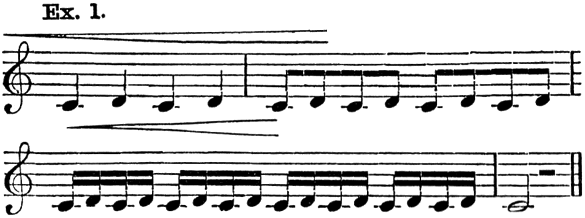




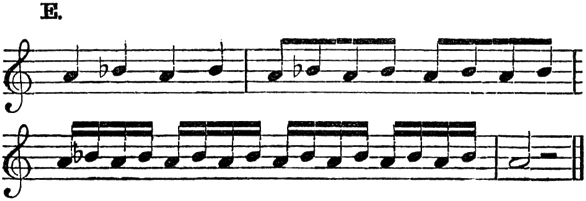
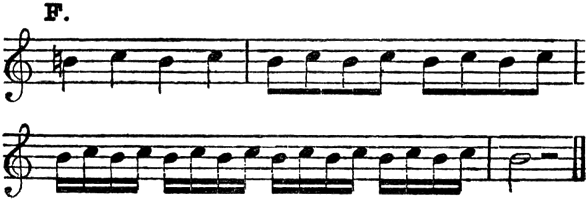


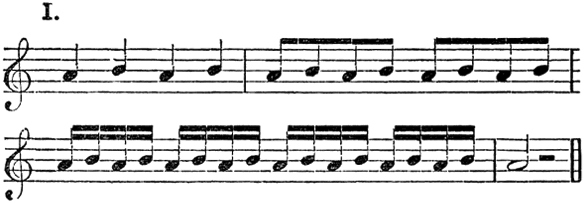


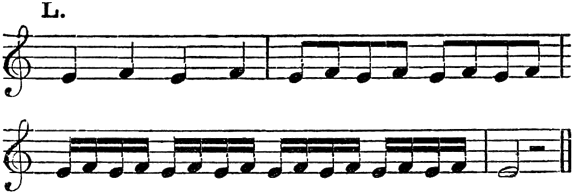
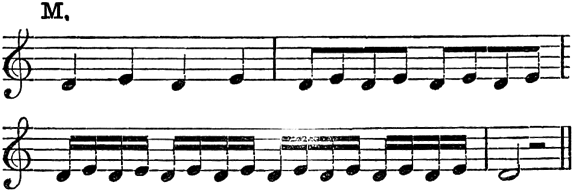
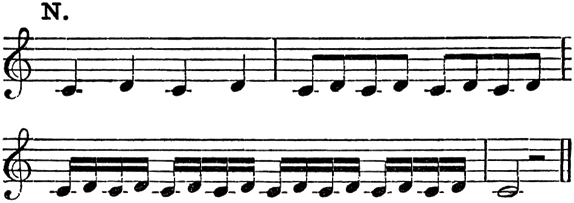
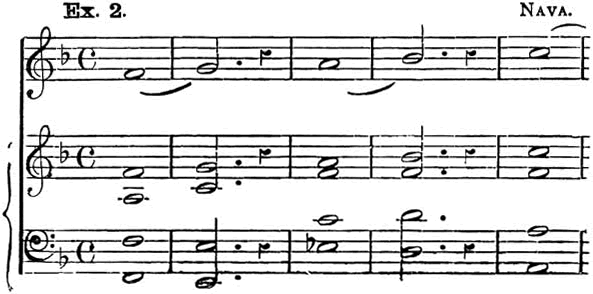
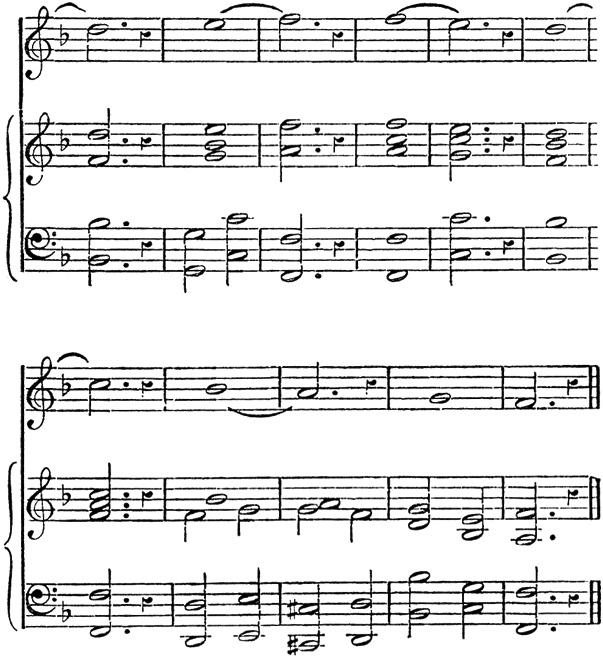
Exercise 2 is a further one for the practice of joining notes with the aid of the breath, without the least resemblance to a jerk with either the sound or the breath. To sing the exercise with advantage requires a very careful management of the respiratory organs, and its continuous practice is one of the best means of managing the breath. Having inspired the breath after the manner already indicated herein, proceed to sound the note F in a thin but firm and steady tone, which you must gradually swell, by pressing down the breath, as it were, into the following note G, which you will continue to hold steadily by keeping down the[Pg 120] breath as long as you can. Though you raise your tone of voice in passing from F to G, you must dispel from your mind all notions of raising your breath or your larynx; it is just the reverse; you must lower these. Remember a golden rule—the higher your note the lower must it be generated in your chest, and your breath must be under the note supporting it, or there cannot possibly be any tone there. On reaching the highest limit of this exercise, the student will repeat the same operation down the scale, which I need scarcely say is less difficult.
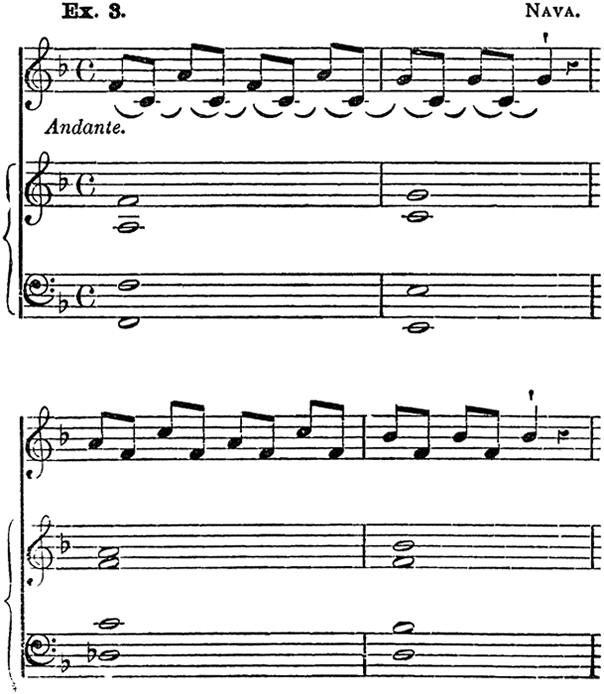

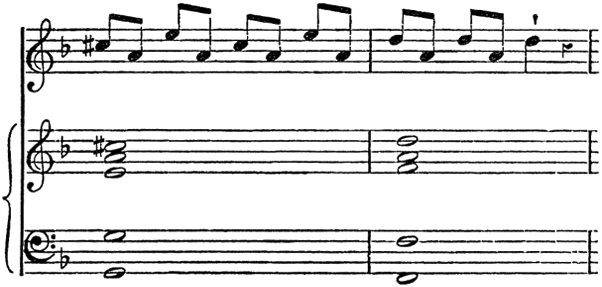
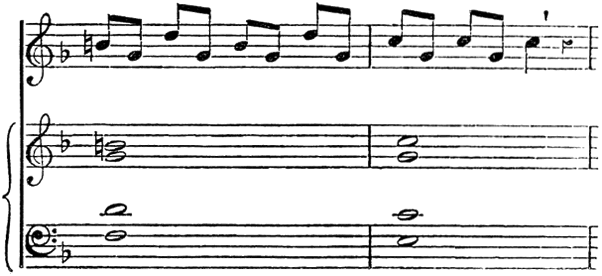
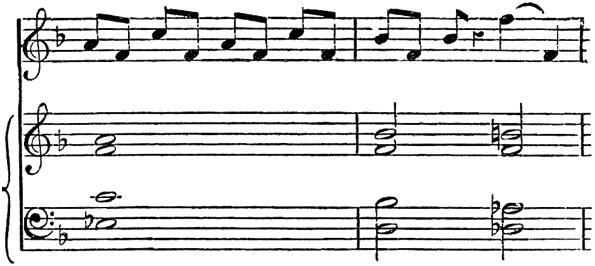
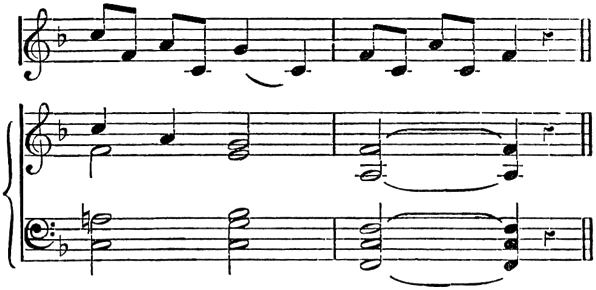
Exercise 3 may be timed 76 on your metronome. It is a study to give freedom and flexibility to your voice. None of the notes should be forced, and the upper notes should be rendered with the mouth well open, and with a quality of tone as similar as possible to that of the lower notes. Breath should be taken (without losing time) at the rest-marks. There should be no break or jump in the tone, but rather it should be one unbroken stream of melody, as marked in the first phrase. The voice, in this exercise, should be constantly moving: no sooner should you be sounding the first note of the phrase than you should be moving to the second, from the second to the next, and so on. Be careful to sing the intervals exactly in time, and in descending to notes satisfy yourself that you are singing the exact tone, and that with certainty. Indecision is a grave fault in singing.
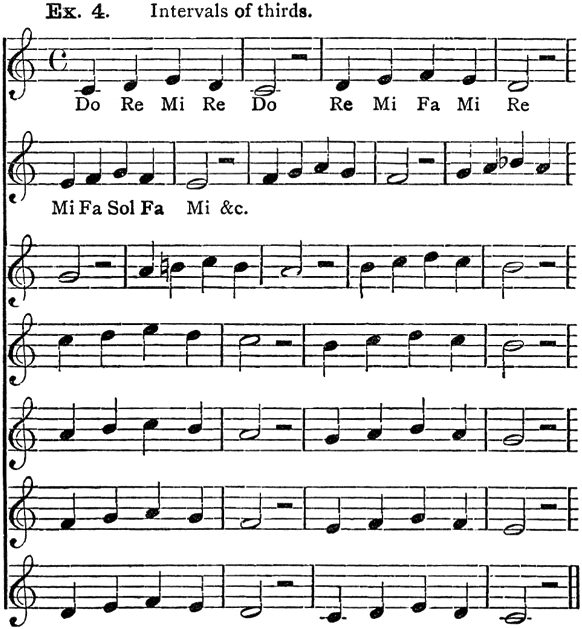
Do Re Mi Re Do Re Mi Fa Mi Re
Mi Fa Sol Fa Mi &c.
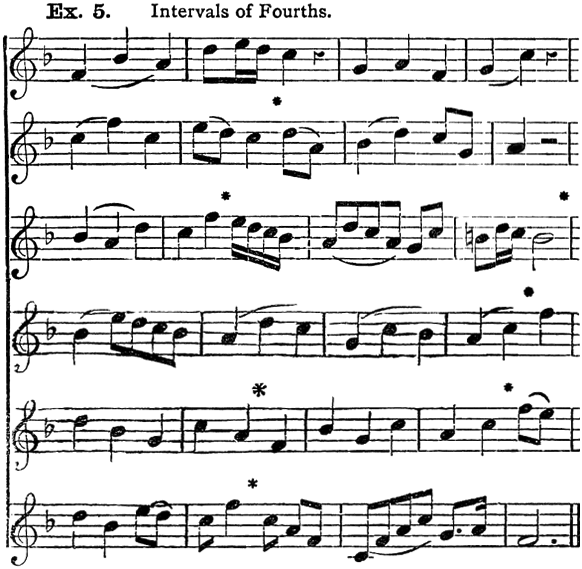
* Here take breath.
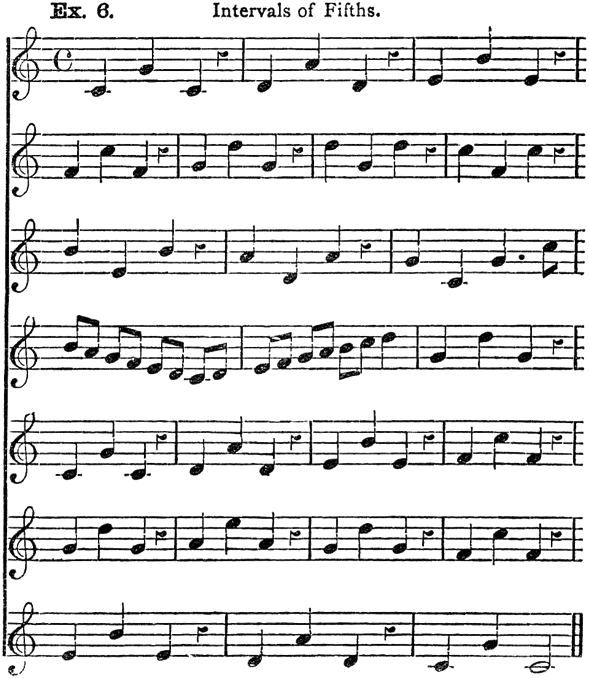
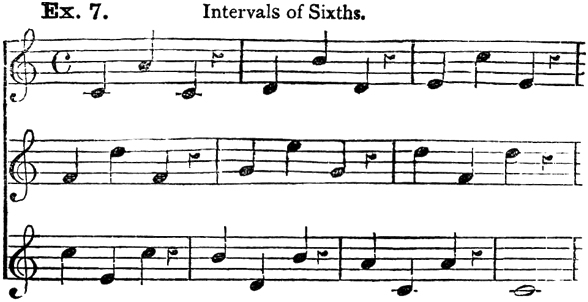
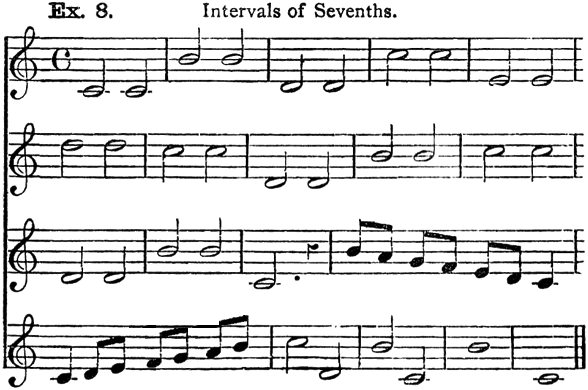
A B C D E F G H I L M N O P Q R S T V W
Alto, 36
Bad Lessons, 50
Bad Masters, 50
Ballads, 80
Barytone, Basso-Cantante, 42
Bass, 44
Board Teachers' Laryngitis, 114
Books of Exercises, 51
Buffo, 48
Cathedral School, The, 72
Chest, Falsetto, and Head, 60
Chorus Singing, 69
Cleanliness, 13
Clearing the Throat, 59
Compass, 30
Consonants, 24
Contralto, 35
Decision, 84
Diet, 13
Dramatic Study, 27
Dress, 16
Duration of Practice, 67
Early Rising, 13
Education, General, 26
Emphasis, 25
English, 24
Execution, 105
Exercise, 15
Exercises, 115
Exercises, First, 62
" Books of, 51
" in Beating Time, 89
Expression, Facial, 54
Facial Expression, 54
Falsetto, 60
Fashion, 106
[Pg 127]
First Opinion, A, 44
Forming a Repertoire, 107
Forte, Mezzo-Voce, and Piano, 60
General Education, 26
" Musical Study, 70
German Lieder, Modern, 71
Hair, The, 14
Head, Singing in the, 58
High Notes, 59
"Holding" an Audience, 86
"How to Begin", 68
Humming, 69
Imitation, 70, 85
Individuality, 53
Institutions, 48
Larynx, The, 109
Late Hours, 19
Lessons, Bad, 50
Lips, Position of, 25
Masters, 48
Mezzo-Voce, 60
Mezzo-Contralto, 35
Mezzo-Soprano, 34
Mistakes in Public, 86
Modern German Lieder, 71
Morality, 19
Music to Suit the Voice, 103
Musical Study, General, 70
Names of Voices, 29
Nervousness, 21
Oratorio, 73
"Original Keys", 104
Opera, 79
Perseverance, 54
Physiological Surroundings, 109
Pharynx, The, 111
Position of Arms, 55
" " Body, 55
" " Hands, 56
" " Larynx, 57
" " Throat, 56
" " Tongue, 57
Pronunciation, 22
Public Singing, 85
Public, Mistakes in, 86
Qualities of the Voice, 45
Recitative, 81
Repertoire, Forming a, 107
Scale, The, 60
" Practice, 62
"Schools" of Singing, 47
Self-Accompaniment, 55
Sentiment, 84
Singing in Tune, 67
Slurring, 83
Smoking, 18
Soprano, 32
Study of Songs, 20
Study of Words, 25
Styles, Traditional, 71
Teachers, Bad, 50
Teeth, The, 15
Tenore-Leggiero, 37
Tenore-Robusto, 39
Throatiness, 58
Thyroid, The, 110
Time in Singing, 87
Tone, 60
Traditional Styles, 71
Variety Indispensable, 68
Voices and their Names, 29
Voice, The; A Wind, Reed, or String Instrument, 111
Vowel-Sounds, 23
"Words," Study of, 25
Printed by Ballantyne, Hanson & Co.
London & Edinburgh
[1] It used to be said of Rubini that "he had tears in his voice."
[2] The Exercise should be a crescendo from piano to forte.
Punctuation and formatting markup have been made consistent.
Apparent printer's errors have been retained, unless stated below.
Page 62, "disirable" changed to "desirable". (It cannot be too strongly impressed upon, or too frequently pointed out to, the singer (no matter what may be the stage of his or her artistic development) how desirable and advantageous it is to be constantly singing exercises and solfeggi in preference to songs.)
Page 73 and 74, "shool" changed to "school". (You will find its good points equally insisted on in the oratorio school of singing, while its defects should be avoided in any.)
In Exercise 11 on Page 94, the twelfth bar in the the original image began with a quaver. To retain rhythmic integrity, this has been edited to read as a crotchet.
In Exercise 6 on Page 98, the tenth and eleventh bar in the the original image were reversed. For consistency, these bars have been corrected.
Page 106, "divisious" changed to "divisions". (Those who have ever delighted as well as astonished us by their rapid manner of running through divisions must have been naturally endowed with flexible organs.)
Page 109, "λαρυγξ" changed to "λάρυγξ".
On page 110, "ἁρύταινα" was intentionally retained. This may be a typo for "ἀρύταινα".
Page 111, "φάρυνξ" changed to "φάρυγξ".
In Exercise 4 on Page 123, the seventh bar in the the original image began with an E. In order to maintain the pattern, this has been edited to read as an F.
In Exercise 5 on Page 124, the twelfth bar in the the original image contained four beats. The first note of the measure, which was a minim, has been changed to a crotchet.
In Exercise 7 on Page 125, the last measure contained three beats. The last note of the exercise, which was printed as a dotted minim, has been changed to a semibreve.
In Exercise 8 on Page 125, the rhythm in the measure was originally written as a crotchet, two quavers, a crotchet, two quavers, and a crotchet, making five beats in the measure of common time. The measure has been edited to read as a single crotchet, followed by six quavers in order to retain four beats in each measure.
***END OF THE PROJECT GUTENBERG EBOOK ADVICE TO SINGERS***
******* This file should be named 41013-h.txt or 41013-h.zip *******
This and all associated files of various formats will be found in:
http://www.gutenberg.org/4/1/0/1/41013
Updated editions will replace the previous one--the old editions will be renamed.
Creating the works from public domain print editions means that no one owns a United States copyright in these works, so the Foundation (and you!) can copy and distribute it in the United States without permission and without paying copyright royalties. Special rules, set forth in the General Terms of Use part of this license, apply to copying and distributing Project Gutenberg-tm electronic works to protect the PROJECT GUTENBERG-tm concept and trademark. Project Gutenberg is a registered trademark, and may not be used if you charge for the eBooks, unless you receive specific permission. If you do not charge anything for copies of this eBook, complying with the rules is very easy. You may use this eBook for nearly any purpose such as creation of derivative works, reports, performances and research. They may be modified and printed and given away--you may do practically ANYTHING with public domain eBooks. Redistribution is subject to the trademark license, especially commercial redistribution.
To protect the Project Gutenberg-tm mission of promoting the free distribution of electronic works, by using or distributing this work (or any other work associated in any way with the phrase "Project Gutenberg"), you agree to comply with all the terms of the Full Project Gutenberg-tm License available with this file or online at www.gutenberg.org/license.
1.A. By reading or using any part of this Project Gutenberg-tm electronic work, you indicate that you have read, understand, agree to and accept all the terms of this license and intellectual property (trademark/copyright) agreement. If you do not agree to abide by all the terms of this agreement, you must cease using and return or destroy all copies of Project Gutenberg-tm electronic works in your possession. If you paid a fee for obtaining a copy of or access to a Project Gutenberg-tm electronic work and you do not agree to be bound by the terms of this agreement, you may obtain a refund from the person or entity to whom you paid the fee as set forth in paragraph 1.E.8.
1.B. "Project Gutenberg" is a registered trademark. It may only be used on or associated in any way with an electronic work by people who agree to be bound by the terms of this agreement. There are a few things that you can do with most Project Gutenberg-tm electronic works even without complying with the full terms of this agreement. See paragraph 1.C below. There are a lot of things you can do with Project Gutenberg-tm electronic works if you follow the terms of this agreement and help preserve free future access to Project Gutenberg-tm electronic works. See paragraph 1.E below.
1.C. The Project Gutenberg Literary Archive Foundation ("the Foundation" or PGLAF), owns a compilation copyright in the collection of Project Gutenberg-tm electronic works. Nearly all the individual works in the collection are in the public domain in the United States. If an individual work is in the public domain in the United States and you are located in the United States, we do not claim a right to prevent you from copying, distributing, performing, displaying or creating derivative works based on the work as long as all references to Project Gutenberg are removed. Of course, we hope that you will support the Project Gutenberg-tm mission of promoting free access to electronic works by freely sharing Project Gutenberg-tm works in compliance with the terms of this agreement for keeping the Project Gutenberg-tm name associated with the work. You can easily comply with the terms of this agreement by keeping this work in the same format with its attached full Project Gutenberg-tm License when you share it without charge with others.
1.D. The copyright laws of the place where you are located also govern what you can do with this work. Copyright laws in most countries are in a constant state of change. If you are outside the United States, check the laws of your country in addition to the terms of this agreement before downloading, copying, displaying, performing, distributing or creating derivative works based on this work or any other Project Gutenberg-tm work. The Foundation makes no representations concerning the copyright status of any work in any country outside the United States.
1.E. Unless you have removed all references to Project Gutenberg:
1.E.1. The following sentence, with active links to, or other immediate access to, the full Project Gutenberg-tm License must appear prominently whenever any copy of a Project Gutenberg-tm work (any work on which the phrase "Project Gutenberg" appears, or with which the phrase "Project Gutenberg" is associated) is accessed, displayed, performed, viewed, copied or distributed:
This eBook is for the use of anyone anywhere at no cost and with almost no restrictions whatsoever. You may copy it, give it away or re-use it under the terms of the Project Gutenberg License included with this eBook or online at www.gutenberg.org
1.E.2. If an individual Project Gutenberg-tm electronic work is derived from the public domain (does not contain a notice indicating that it is posted with permission of the copyright holder), the work can be copied and distributed to anyone in the United States without paying any fees or charges. If you are redistributing or providing access to a work with the phrase "Project Gutenberg" associated with or appearing on the work, you must comply either with the requirements of paragraphs 1.E.1 through 1.E.7 or obtain permission for the use of the work and the Project Gutenberg-tm trademark as set forth in paragraphs 1.E.8 or 1.E.9.
1.E.3. If an individual Project Gutenberg-tm electronic work is posted with the permission of the copyright holder, your use and distribution must comply with both paragraphs 1.E.1 through 1.E.7 and any additional terms imposed by the copyright holder. Additional terms will be linked to the Project Gutenberg-tm License for all works posted with the permission of the copyright holder found at the beginning of this work.
1.E.4. Do not unlink or detach or remove the full Project Gutenberg-tm License terms from this work, or any files containing a part of this work or any other work associated with Project Gutenberg-tm.
1.E.5. Do not copy, display, perform, distribute or redistribute this electronic work, or any part of this electronic work, without prominently displaying the sentence set forth in paragraph 1.E.1 with active links or immediate access to the full terms of the Project Gutenberg-tm License.
1.E.6. You may convert to and distribute this work in any binary, compressed, marked up, nonproprietary or proprietary form, including any word processing or hypertext form. However, if you provide access to or distribute copies of a Project Gutenberg-tm work in a format other than "Plain Vanilla ASCII" or other format used in the official version posted on the official Project Gutenberg-tm web site (www.gutenberg.org), you must, at no additional cost, fee or expense to the user, provide a copy, a means of exporting a copy, or a means of obtaining a copy upon request, of the work in its original "Plain Vanilla ASCII" or other form. Any alternate format must include the full Project Gutenberg-tm License as specified in paragraph 1.E.1.
1.E.7. Do not charge a fee for access to, viewing, displaying, performing, copying or distributing any Project Gutenberg-tm works unless you comply with paragraph 1.E.8 or 1.E.9.
1.E.8. You may charge a reasonable fee for copies of or providing access to or distributing Project Gutenberg-tm electronic works provided that
1.E.9. If you wish to charge a fee or distribute a Project Gutenberg-tm electronic work or group of works on different terms than are set forth in this agreement, you must obtain permission in writing from both the Project Gutenberg Literary Archive Foundation and Michael Hart, the owner of the Project Gutenberg-tm trademark. Contact the Foundation as set forth in Section 3 below.
1.F.
1.F.1. Project Gutenberg volunteers and employees expend considerable effort to identify, do copyright research on, transcribe and proofread public domain works in creating the Project Gutenberg-tm collection. Despite these efforts, Project Gutenberg-tm electronic works, and the medium on which they may be stored, may contain "Defects," such as, but not limited to, incomplete, inaccurate or corrupt data, transcription errors, a copyright or other intellectual property infringement, a defective or damaged disk or other medium, a computer virus, or computer codes that damage or cannot be read by your equipment.
1.F.2. LIMITED WARRANTY, DISCLAIMER OF DAMAGES - Except for the "Right of Replacement or Refund" described in paragraph 1.F.3, the Project Gutenberg Literary Archive Foundation, the owner of the Project Gutenberg-tm trademark, and any other party distributing a Project Gutenberg-tm electronic work under this agreement, disclaim all liability to you for damages, costs and expenses, including legal fees. YOU AGREE THAT YOU HAVE NO REMEDIES FOR NEGLIGENCE, STRICT LIABILITY, BREACH OF WARRANTY OR BREACH OF CONTRACT EXCEPT THOSE PROVIDED IN PARAGRAPH 1.F.3. YOU AGREE THAT THE FOUNDATION, THE TRADEMARK OWNER, AND ANY DISTRIBUTOR UNDER THIS AGREEMENT WILL NOT BE LIABLE TO YOU FOR ACTUAL, DIRECT, INDIRECT, CONSEQUENTIAL, PUNITIVE OR INCIDENTAL DAMAGES EVEN IF YOU GIVE NOTICE OF THE POSSIBILITY OF SUCH DAMAGE.
1.F.3. LIMITED RIGHT OF REPLACEMENT OR REFUND - If you discover a defect in this electronic work within 90 days of receiving it, you can receive a refund of the money (if any) you paid for it by sending a written explanation to the person you received the work from. If you received the work on a physical medium, you must return the medium with your written explanation. The person or entity that provided you with the defective work may elect to provide a replacement copy in lieu of a refund. If you received the work electronically, the person or entity providing it to you may choose to give you a second opportunity to receive the work electronically in lieu of a refund. If the second copy is also defective, you may demand a refund in writing without further opportunities to fix the problem.
1.F.4. Except for the limited right of replacement or refund set forth in paragraph 1.F.3, this work is provided to you 'AS-IS', WITH NO OTHER WARRANTIES OF ANY KIND, EXPRESS OR IMPLIED, INCLUDING BUT NOT LIMITED TO WARRANTIES OF MERCHANTABILITY OR FITNESS FOR ANY PURPOSE.
1.F.5. Some states do not allow disclaimers of certain implied warranties or the exclusion or limitation of certain types of damages. If any disclaimer or limitation set forth in this agreement violates the law of the state applicable to this agreement, the agreement shall be interpreted to make the maximum disclaimer or limitation permitted by the applicable state law. The invalidity or unenforceability of any provision of this agreement shall not void the remaining provisions.
1.F.6. INDEMNITY - You agree to indemnify and hold the Foundation, the trademark owner, any agent or employee of the Foundation, anyone providing copies of Project Gutenberg-tm electronic works in accordance with this agreement, and any volunteers associated with the production, promotion and distribution of Project Gutenberg-tm electronic works, harmless from all liability, costs and expenses, including legal fees, that arise directly or indirectly from any of the following which you do or cause to occur: (a) distribution of this or any Project Gutenberg-tm work, (b) alteration, modification, or additions or deletions to any Project Gutenberg-tm work, and (c) any Defect you cause.
Project Gutenberg-tm is synonymous with the free distribution of electronic works in formats readable by the widest variety of computers including obsolete, old, middle-aged and new computers. It exists because of the efforts of hundreds of volunteers and donations from people in all walks of life.
Volunteers and financial support to provide volunteers with the assistance they need are critical to reaching Project Gutenberg-tm's goals and ensuring that the Project Gutenberg-tm collection will remain freely available for generations to come. In 2001, the Project Gutenberg Literary Archive Foundation was created to provide a secure and permanent future for Project Gutenberg-tm and future generations. To learn more about the Project Gutenberg Literary Archive Foundation and how your efforts and donations can help, see Sections 3 and 4 and the Foundation information page at www.gutenberg.org
The Project Gutenberg Literary Archive Foundation is a non profit 501(c)(3) educational corporation organized under the laws of the state of Mississippi and granted tax exempt status by the Internal Revenue Service. The Foundation's EIN or federal tax identification number is 64-6221541. Contributions to the Project Gutenberg Literary Archive Foundation are tax deductible to the full extent permitted by U.S. federal laws and your state's laws.
The Foundation's principal office is located at 4557 Melan Dr. S. Fairbanks, AK, 99712., but its volunteers and employees are scattered throughout numerous locations. Its business office is located at 809 North 1500 West, Salt Lake City, UT 84116, (801) 596-1887. Email contact links and up to date contact information can be found at the Foundation's web site and official page at www.gutenberg.org/contact
For additional contact information:
Dr. Gregory B. Newby
Chief Executive and Director
gbnewby@pglaf.org
Project Gutenberg-tm depends upon and cannot survive without wide spread public support and donations to carry out its mission of increasing the number of public domain and licensed works that can be freely distributed in machine readable form accessible by the widest array of equipment including outdated equipment. Many small donations ($1 to $5,000) are particularly important to maintaining tax exempt status with the IRS.
The Foundation is committed to complying with the laws regulating charities and charitable donations in all 50 states of the United States. Compliance requirements are not uniform and it takes a considerable effort, much paperwork and many fees to meet and keep up with these requirements. We do not solicit donations in locations where we have not received written confirmation of compliance. To SEND DONATIONS or determine the status of compliance for any particular state visit www.gutenberg.org/donate
While we cannot and do not solicit contributions from states where we have not met the solicitation requirements, we know of no prohibition against accepting unsolicited donations from donors in such states who approach us with offers to donate.
International donations are gratefully accepted, but we cannot make any statements concerning tax treatment of donations received from outside the United States. U.S. laws alone swamp our small staff.
Please check the Project Gutenberg Web pages for current donation methods and addresses. Donations are accepted in a number of other ways including checks, online payments and credit card donations. To donate, please visit: www.gutenberg.org/donate
Professor Michael S. Hart was the originator of the Project Gutenberg-tm concept of a library of electronic works that could be freely shared with anyone. For forty years, he produced and distributed Project Gutenberg-tm eBooks with only a loose network of volunteer support.
Project Gutenberg-tm eBooks are often created from several printed editions, all of which are confirmed as Public Domain in the U.S. unless a copyright notice is included. Thus, we do not necessarily keep eBooks in compliance with any particular paper edition.
Most people start at our Web site which has the main PG search facility: www.gutenberg.org
This Web site includes information about Project Gutenberg-tm, including how to make donations to the Project Gutenberg Literary Archive Foundation, how to help produce our new eBooks, and how to subscribe to our email newsletter to hear about new eBooks.